#but ultimately even in the most extreme case - which is contradicted by actual evidence - the final say would have been Henry's
Explore tagged Tumblr posts
Text
Friendly reminder that Francesco Coppino and Prospero di Camulio, contemporaries who were literally getting their information from predominantly Yorkist circles, were both explicitly clear that it was Henry VI who decided to surrender Berwick to Scotland.
Camulio: "King Henry has given away a castle [town] called Berwick, which is one of the keys of the frontier between England and Scotland." Coppino: "[Scotland has] received from the same Henry the town of Berwick, on the frontiers of Scotland, which the Scots have long claimed as their right from the English, as the excellently well furnished guardian of their frontiers, and the place to which King Henry repaired as an asylum after the battle."
The idea that Margaret of Anjou was principally involved in the surrender, or that she was the one who actually made the decision, is based on the claims of later chronicles. Two direct contemporaries, both speaking of ongoing events as they unfolded, who were both getting information from Yorkist-held England, both clearly believed it was Henry who was responsible for this course of action. Neither of them mention Margaret. Sure, you can argue that it was merely rhetorical, and that they were simply automatically attributing such an important decision to the King rather than the queen - but rhetoric is nonetheless extremely important and helps us understand how historical figures were perceived at the time. Margaret's enemies would surely not have hesitated to broadcast her involvement had it actually been true, and Coppino in particular had shown no qualms about criticizing her in favor of the Yorkists before. If she was genuinely believed to have been responsible, and if the Yorkists were actually claiming that she was at the time, I see no reason why Coppino or Camulio would not have emphasized her role in their letters. What these samples instead indicate is literally the opposite: that their contemporaries - probably including the Yorkists who were putting out the information that Coppino and Camulio reported - actually believed that Henry was the one making the decision. I think it's a very large and very unnecessary stretch to go against actual evidence and claim otherwise by placing the responsibility on Margaret instead.
Additionally, these small samples may also reveal what people at the time - once again including the Yorkists - actually thought of Henry's role in the war on a broader level, away from direct Yorkist propaganda which would obviously and perhaps understandably seek to de-emphasize it: namely, that Henry was perceived as the one making decisions and deciding the courses of action for his own side.
Source: Excerpts from the Calendar of State Papers and Manuscripts, Existing in the Archives and Collections of Milan
#henry vi#margaret of anjou#english history#my post#I want to make a longer post detailing the clear indications we have that Henry *was* perceived as the active decision maker of his side#which indicates that contemporaries did not really think that there was some kind of giant 'role-reversal' between him and MoA#but until then the gist is:#after Henry was rescued in 1461 contemporary letters clearly emphasize his own actions; they mostly did not attribute decisions to Margaret#we also know he and Margaret separated when she headed off to the continent;#that he seems to have been involved in border-raids against Yorkist England;#*and* that he avoided capture until 1465#if Henry was entirely passive throughout it all and entirely dependent on Margaret to make decisions#I do not understand how any of this would have been possible#Instead Henry & Margaret seemed to have had more of a partnership with Margaret focusing on gaining international support#which she was very well-suited for given her powerful foreign connections#& with her taking on leadership in his absence (mainly due to imprisonment/incapacity) rather than all the time/when they were together#and like I said when it comes to Berwick contemporaries clearly believed it was Henry's decision#but also like. let's hypothetically assume that Margaret was the driving force behind it. please think of this situation logically.#whoever's idea it was Scotland was very obviously going to want a proper confirmation from the *king*#who was. yk. the actual authority of the country#even if Margaret was the one encouraging this surrender Henry's approval and agreement would have still been required#if not by the Lancastrian party then by Scotland#and again this is assuming that Margaret was actually the driving force behind it. there's no indication that she was#but ultimately contemporaries very clearly believed *Henry* was responsible#we don't know what MoA actually thought of it or what her actual involvement was (she could may encouraged it; she may have misliked it;#she may have simply been told after the decision had already been made)#but ultimately even in the most extreme case - which is contradicted by actual evidence - the final say would have been Henry's#it would be nice if this was reflected by historians?
14 notes
·
View notes
Text
The Unified Theory of Ki Supplemental 1: Saiyans, Their Potential, and Their Forms
Disclaimer: As a quick reminder before anyone comes in with a snarky "Toriyama didn't think about it this much..."
Obviously. The point of this isn't to explain how Toriyama/Toyotaro/The Dragon Room think of Ki or mechanics they implemented into their story. It's to take a look at ideas that have been explored in the series and then work backwards to create a series of mechanics that effectively and satisfactorily covers the work. It is fanfiction in the form of technical writing, not to be taken as fact, but as a interesting at least, and a different way to look at the series for fun at best. Or as a way to spec out game mechanics if that's something anyone's looking to do.
Disclaimer 2: I am firmly on the side of Toriyama, Z, and Super that the Saiyan tail is a crutch that a Saiyan must overcome to reach their full potential, not the Saiyan's actual power. SSJ4 isn't in here because, like much of GT, it's a contradiction and fitting it into the rest of the framework is difficult. I might take a stab at it some other time, though.
Ultra Instinct and Ultra Ego are also absent from this because not only are they not exclusively Saiyan forms (which applies to Kaioken and Ultimate, both of which I've included), but I don't think there's interesting interplay with what I'm proposing in terms of Saiyans' relationship with Ki. They're their own set of abilities that don't really care about the others.
With all of that out of the way
The Unified Theory of Ki - Supplemental 1: Potential, Saiyans, and Forms
Section 1: Let's Talk Potential
While this supplemental is meant to cover Saiyan biology as it pertains to ki more than anything, there's something we have to get out of the way first. Let's talk potential, as it's something that comes up frequently in the series. It's a difficult thing to understand, given how haphazardly "latent potential" is thrown around and the various things it can mean. I think we can discard out of hand the idea of it meaning "the most powerful can ever be." That interpretation never really made sense without separating the two rituals to unlock potential that we saw on screen into two different things. And while the different lengths of time those two rituals took could allow for that to be the case, later evidence from Super would contradict this. Besides that, I think that the difference would be better explained as efficacy. Guru and Old Supreme Kai both did the same thing, but Old Supreme Kai's delved deeper.
I would argue that what "potential" means in this case is tapping into power you would normally have to exert one's self to use temporarily and making it a part of your normal reservoir. Characters' power levels have been shown to fluctuate based on emotional state and exertion, though not to the extremes Gohan's rage is generally capable of producing. I would then argue that what both Guru and Old Kai are doing is making that exerted power a more natural state for the subject. This is why Gohan's boost is so wildly different from Krillin's, as it's making his rage boosted stats a part of his natural power, and why he doesn't get another proper rage boost until reaching SSJ2. Meanwhile Krillin is simply receiving the full power of what he can do when exerting himself. I would also posit that Guru's power up was permanent for the both of them, which is why even when his training lapsed, Krillin remained stronger than Tenshinhan. Still, it does not transcend Saiyan transformations for a very specific reason.
Section 2: Saiyan "Potential"
Alright, let's just get this out of the way. We all know that Saiyans are special, but in what way. Most of them are relatively powerful to start, if they hadn't had their potential (common use of the phrase) stunted by their tails and the use of the Oozaru form then they'd have been as insanely powerful as their U6 counterparts. How does this fit into the framework I'm creating?
My notion is this: Saiyans are naturally gifted, well beyond what the average Saiyan would lead you to believe. Their actual power functions a lot like cockroaches: what you see is only a fraction of the whole. They are natural born ki turbines meant to generate power well beyond what most species in the galaxy are capable of, including embers of god ki. The problem is that Saiyans, in their natural state, are inherently terrible at accessing and utilizing any of this power. And the culture of U7 only served to encourage this natural flaw. Everyone of the Saiyans' various forms and evolutionary elements is an expression of their bodies trying to reach their true power. But that power can only really be accessed through physical and emotional growth. Not shortcuts.
This differs from the potential referred to in the previous section, which is simply the maximum amount of power you can output at your current strength. It is not unlocked by potential unlocking rituals because it's a different thing entirely. Without the right training or the right forms, Saiyans are completely walled off from this power, unlike the power of "potential" that comes from simple exertion.
Section 3: Saiyan States, Power Ups, and Forms
Disclaimer 3: Refer to Disclaimer 1. The same applies here. If it's something that isn't shown in the manga or show and I don't say that it's based on a statement from Toriyama, assume that it is speculation in line with the overall goal of this project: making a unified working ruleset based on the content of the series for entertainment purposes. I will often, but not always, denote these parts with speculative phrasing.
Base Forms -
Base Saiyan with Tail - Base
The default state of all full-blood, and some hybrid, Saiyans and the weakest a Saiyan can be. The tail grants the Saiyan both a boosted power level in their natural state and access to the Oozaru transformation. The drawbacks are that, when grabbed, the insufficiently trained Saiyan will lose all strength and when removed the Saiyan will suffer a massive power loss. With sufficient growth, the Saiyan no longer needs the tail to have the same power it once provided.
Within this framework I would argue that the Saiyan tail is a taproot into their underlying power. A quick, cheap boost that all Saiyans are born with in compensation for how poor they are on the whole at accessing their walled off power reserves.
Oozaru - Psuedo-Super Saiyan
Oozaru is the Saiyan body's effort to access the Super Saiyan transformation. It's a 10x increase in power level, but I would argue it's an incredibly inefficient spread. Referencing my previous musings on how ki works and judging by the fight with Vegeta, I would argue that most of the Ki output of the Oozaru form is going towards compensating for the massive loss in speed and agility, leaving the Oozaru user roughly as fast as they were before, but only minimally stronger mostly coming from the increase baseline physical strength as opposed to more ki being pumped into increasing strength (though I would say not none). From this state a sufficiently powerful Saiyan could potentially reach true Super Saiyan 1 and may have been how the original Legendary Super Saiyan did so.
Base Saiyan without Tail - Evolved Base
The natural state of U6 Saiyans and U7 Saiyans after either training to integrate the power their tail granted (Goku with Kami in Dragon Ball) or reaching a certain plateau of power where the tail no longer provides a boost (Vegeta, possibly the half-Saiyans). According to Toriyama the bodies of Saiyans eventually determine that the tail is unnecessary so it stops growing back, or in the case of U6 Saiyans, growing at all. This is the state necessary for a Saiyan to properly begin harnessing their potential.
Kaio-Ken - Borrowed Power
This is not an evolution of Saiyan power, but I'm including it for the sake of differentiating it from the way the other boosts in power here work. The Kaio-Ken is a technique that increases power while putting a massive strain on the body. I would argue that, unlike what unlocking potential or Super Saiyan forms do, the Kaio-Ken is not drawing from latent or wasted power. It's forcing the user's body to create power it does not actually have. This is why it not only causes strain during use, but also outright damages the body.
Wrathful - Perfected Oozaru, Still Flawed
The Dragon Ball Super version of Broly used this form. Having achieved the tailless base state a Saiyan needs to reach their full potential, Broly was able to tap into the power of the Oozaru transformation without massively augmenting his body. He gained some amount of size, but not too much, and I would speculate that this made the impact much more potent. There was no massive loss of speed caused by increase of mass, allowing his power to be distributed more evenly. In conjunction with his already massive base power and his ability to grow stronger the longer a battle rages, this is the peak of what Oozaru can grant a Saiyan. The down side is that the form causes Broly immense pain while he also loses most of his faculties.
<===>
Super Saiyan -
Super Saiyan - Reaching the Potential
Through duress (Goku, Cabba) or observation and training (Goten, Trunks, Future Trunks <Manga>, Vegeta <Manga>, Caulifla) this is a Saiyan finally forcefully prying open the doors of their full Saiyan potential. This is just a taste of what they can achieve, as it's the unmastered, raw version of the real thing. It causes both physical and mental stress to maintain the state, making the user more vicious than they might otherwise be and making it difficult to remain in the state when injured or exhausted.
Super Saiyan Grade 2/Ultra Super Saiyan - A Little Further Beyond
This is pushing the form just a little further than it had been, holding the doors to the Saiyan reservoir of power a little wider. Compensates for an increased strain on the body by expanding muscle mass, but not so extremely as to noticeably affect speed. May actually be superior to raw Super Saiyan 1
---
Super Saiyan Grade 3/Ultra Super Saiyan 2 - Oozaru 3.0
Don't get me wrong, it's not using the power of the Oozaru transformation, but it's making the same kinds of mistakes that Oozaru does without the same increase in power to compensate. Grade 3 nudges the door just a little wider than Grade 2, but the increase in power requires an even greater increase in muscle mass so as not to rip the user apart. It's possible that, like Oozaru, a good amount of that increase is being used to maintain speed at similar levels to Grade 2, but it may also be distributing power evenly, and with the boost in power being so small, speed drops off even more sharply than strength grows.
Full Power Super Saiyan - The True Saiyan Form, Evolved Base 2
Full Power Super Saiyan achieves what every form before it has been trying to. It throws wide the doors to the Saiyan's secret reserve of power and incorporates it into their natural state. This is the actual base form of a Saiyan that they've been held back from. Unfortunately, this state can be lost, though simply reverting to base is not an indication of losing access to this form.
Super Saiyan 2 - Super Saiyan, but moreso.
Yes, I'm putting Super Saiyan 2 in the Super Saiyan section and not the Super Saiyan 2 section, but I'm doing it for a reason. As I see it, SSJ2 is not a different form from FPSSJ. Nor is it a "Grade 2" type evolution of the form. What SSJ2 is is the exerted state of SSJ1. A form that cannot be obtained without either mastering SSJ1 or witnessing someone who has. This brings back both the subject of there being a difference between "Potential" and "Saiyan Potential" and the idea of Guru's unlocking of potential not being able to cross beyond transformations. Once Gohan had achieved FPSSJ he once more had a wellspring of unused potential both from the boost everyone can get from exertion and his own massive rage boost. Likewise, Goku and Vegeta learned from this how to exert Super Saiyan into this state. Caulifla then learned it from Goku while Cabba experienced it the way Gohan did.
<===>
Legendary Super Saiyan -
Before getting into SSJ2's variants, let's take a detour to Legendary Super Saiyan for a moment. Now this is even messier than the rest of this subject because its canon versions, and all the offshoots that come from it, were obviously first and foremost meant to be references and nods to the original Broly more than they were given any thought with regards to how they fit into the universe overall. So while all of this is just fanwank for fun, I do try to ground it in elements seen or said in the media or by the creator in interviews. This part, however? This is gonna be almost entirely post-hoc overthought bullshit. But, like I said, this is about making these concepts fit into a functional framework. Also, the names for Broly, Broly, and Kale's forms are all over the place all the time, but since all three of them are referred to as Legendary Super Saiyan at one point or another I'm just going with that
Legendary Super Saiyan - Ignoring the Flaws of Super Saiyan Grade 2
Broly and Kale really are built different. From the blank eyes to the green aura, this is undeniably not the same as Super Saiyan. At least, not exactly the same. I would argue that, unlike most Saiyans, these two possess a secondary well of power. Or, rather, a different primary one. It's not inherently more powerful than the regular Super Saiyan power. In fact, for both of them, they become more powerful once they learn to use the golden glow instead of the green one, but what it is is bottomless. This, more than anything, is what differentiates it from other Super Saiyan forms. Because of this, they have enough energy to make all of the mistakes of Super Saiyan Grade 2 but with none of the drawbacks as the bottomless ki can compensate. And in Broly's case, he continues to grow stronger the longer he fights, making the drawback even more irrelevant. The drawback they do suffer, however, is a total loss of control.
Legendary Super Saiyans' Super Saiyan - Super Saiyan Buff
Unique in canon to Kale but also used by Movie Broly, this is Super Saiyan 1 for a Legendary Super Saiyan. It differs from regular Super Saiyan in that it noticeably increases the size and muscle mass of the user, but to a less extreme degree. The user has greater control over themselves than in the Legendary Super Saiyan and Kale, at least, appeared to become stronger by using this form than she had been in Legendary Super Saiyan. I speculate this form mainlines the Super Saiyan reservoir of power while keeping the Legendary Super Saiyan boundless ki stream open just a crack.
Full Power Legendary Super Saiyan - A Different Flavor of Full Power
Where FPSSJ is throwing wide the doors of Super Saiyan and making that power a natural part of your own, FPLSSJ seems to be a case of the power flowing from the LSSJ pool overflowing their containment. Power grows and the body massively increases in size even more, likely to reduce the strain of holding onto that much power.
True Legendary Super Saiyan - Mastering the Flow
Kale in the anime Tournament of Power and Broly in the Super manga both achieve this state of their Legendary forms. Their eyes return to normal, their bulk reduces (though both remain bigger than their other forms) and their hair and aura remain green. This would, in my estimate, be the inverse of Kale's Super Saiyan form, mostly using the power from LSSJ while incorporating the power of SSJ into it.
<===>
Super Saiyan 2 -
Like I said before, while Super Saiyan 2 has a section, Super Saiyan 2 is not in it. you'll understand why soon.
Super Saiyan 3 - Failed Evolution
It is my belief that Super Saiyan 3 isn't meant to be a form in-and-of itself. More importantly, I don't like the idea that Goku attempted to make a Super Saiyan 2 Grade 2 either. Instead, I posit that Super Saiyan 3 was Goku's effort to master Super Saiyan 2 the same way he did Super Saiyan 1. In other words, it was an attempt at Full Power Super Saiyan 2 that failed. Goku, however, didn't quite grasp that is didn't work, as his being dead prevented him from feeling energy draining strain that the form put on his body. Because of the nature of Super Saiyan 2, that being an exerted version of SSJ1, I suspect there's no natural means of reaching a Full Power equivalent. Gotenks, being a child and a show off, didn't even bother to understand anything about the form, merely copying what Goten and Trunks had witnessed Goku doing.
Super Saiyan Rage - Grade 2 Perfected
Super Saiyan Rage's design and the transformation sequence provide an opportunity for an interesting interpretation. I see it as a work around for Super Saiyan Grade 2's drawbacks while maintaining its benefits applied to Super Saiyan 2. Instead of massively increasing his body size, Trunks externalizes the physical changes into an aura kept tight around himself, effectively still being used as a part of his offense, but no longer weighing him down. A very specific example of ki control vastly increasing power, even though he's not fully controlling all of the ki leaking from him.
Ultimate - A Fortunate Workaround
Gohan's Ultimate form is, in effect, Guru's unlock applied to SSJ2 resulting in that Full power Super Saiyan 2 that Goku was trying for with Super Saiyan 3. Elder Kai's ritual having the additional bonus that Guru's didn't (and didn't need since Gohan was already in peak fighting condition) of polishing off all of Gohan's rust before giving him access to all of his potential power with none of the strain or stress on his body. Of course, once the rust came back he lost the ability to maintain that state effortlessly, but it's still there.
<===>
God Ki -
Super Saiyan God - A Touch of the Divine
Earlier I had mentioned that Saiyans also likely generate a bit of God Ki. This is why I think so. Goku's exposure to the ki of a group of other Super Saiyans allowed him to reach this state, a state wherein he begins to use God Ki instead of just normal Ki. Vegeta also reaches this state after Goku achieved it. I suspect the ritual is only necessary insofar as getting the feel for it without having used it. Vegeta was able to gauge how it was done due to his experience as a fighter and his history with Goku.
Super Saiyan God Super Saiyan/Super Saiyan Blue - Starting Back at 1
This one isn't too complicated. Now that the Saiyan in question can perceive and wield God Ki, they suddenly have access to a wellspring of that as well. Super Saiyan Blue is opening the door to that in the same way SSJ1 did for their potential as a Saiyan.
Super Saiyan Royal Blue/Blue Evolved/Bluer - Full Power Upgrade
This form shares similarities with both Grade 2 and Full Power Super Saiyan, though clearly more like Grade 2 in appearance. However, I'd argue, given the size of the power increase, it's actually more along the lines of Full Power in terms of results. There seems to be little strain, though the muscle mass does have a noticeable increase (not to Grade 2's extreme, however). The hair changes shades, similar to Full Power, while the aura is different depending on whether it's the manga or anime. Still, given his history, I'd like to think Vegeta learned from his mistakes and chose to develop his new form more along the lines he was shown before.
<===>
Previous Work referenced in this -
4 notes
·
View notes
Text
Fanfic Alder is a curious creature. Authors are so hung up on the immortality and hierarchy of it all, so somehow fanon Alder is cold and stiff and humorless, doesn't apologize, is awkward around people, etc. She warmly blesses the fosterlings in episode 2 of the show, and the very first thing she does when meeting with the Hague is crack a joke while saying sorry for being late. And nothing to mention of which she demonstrates the full blast of her Lyne Renee charisma several times, to strangers and acquaintances alike. If anything, her problem is that she slips into passionate speeches too much, when not knowing what to say might have been better (e.g. after General Clary lost her daughter to the Spree in episode 2). Petra is the only one who implies to her that she had stopped being human, but she's an extremely unreliable narrator with an agenda. Alder being heavyhanded with her authority (being corrupted by power) is arguably the most human instinct. In a lot of respects, Alder's sin was that she wasn't inhuman enough (which was rectified by becoming an agent of mushroom the next season lawl). Even as a mushroom, she's at ease in her "skin", from shrugging off Elayne's song to her comfortable meeting with the Marshal. (I am pretty sure that the nachos were more about trolling than just personal enjoyment.) One moment that might support the "awkward Alder" interpretation is when she was surprised by the intensity of the NOD protest at the opening of the testing centers. But even then, she immediately recovers to deliver her expert political schmoozing to the cameras over their yells. Another case seems to be that Alder does valorize glory (or she tries to impart a culture of valorizing glory to the conscripts), and we do see an example of a character who drinks that Kool-aid being awkward frequently: Abigail! But the difference is, Abigail was awkward because she didn't yet have experience to back up the rhetoric when someone like Adil punctured it. Alder doesn't have that problem, such as when confronted with Khalida. Khalida has to just railroad her instead of actually addressing her points (and we see that Khalida and Adil will ultimately concede those points with their actions when the rubber meets the road). Which gets me deep into the "defending Alder" weeds, because I noticed that people (in the show) rarely ever challenged Alder with, um, facts and logic? Which is to say, Alder's authority in the present time is backed up with All Of The Experience. When people argue with her, they should have real empirical evidence to contradict that, but they almost never do. So it's like, no wonder Alder gets so annoyed with her antagonists, when they're all such shit debaters? (With the two noticeable exceptions being Anacostia and Tally in S2, the former when Alder is clearly jerking her around between ops to affirm her loyalty, and the latter when she talks back to Alder to bring her unit on the Nicte mission. Both of them argue their cases with principles, not just a vague "your attitude annoys me" sneer. That's why their eventual disobedience rings true, instead of being power plays. They were pursuing truth, not position.) I think what rubs me wrong about fanon Alder is that the configuration of when any potential awkward happens is backwards. The fanfic always imagines that Alder doesn't know how not to be the General, that she would be at her most uncomfortable during peacetime. But in canon, the opposite is true. Alder only goes off the rails when threatened by loss (loss of her family, her soldiers, her power which she has mentally linked with her ability to protect). Not only does she have a large comfort zone attending social events, in episode 4 she emphasizes how the holidays are NOT meant to be a military tactic, but sacred. She doesn't make her mistakes absent intense conflict (unless you count her designating Bellweather unit as war meat in revenge against Petra and Wade's power play, but such pettiness still falls under being more human than less).
#motherland fort salem#sarah alder#category: tv#category: fandom#note that this is the furthest thing from Petra bashing. I love Petra a lot!#I cut the fate stay night reference from this post; you're welcome
6 notes
·
View notes
Note
Favorite PolSci paper?
...you should really know not to expect anything resembling concision from me, my friend.
So, uh...I'm not even gonna try to pick one.
The thing about me and political science is that I skew a lot closer to the humanities end of the analytical pool; I tend to be more inductive than deductive and it shows. I also tend to be skeptical of most work's explanatory power, and extremely skeptical about anything claiming predictive power. My favorite work tends to incorporate historical research and ethnographic data, and I tend enjoy critique papers and theory building. I tend to like "mid-level" approaches, where people try to study a specific phenomenon rather than going for large unifying theoretical questions, because I favor smaller knowledge claims with more data behind them. It's harder to build than tear down, and unfortunately I just love "tearing down" work. That said, there are some things that are really hard to research, and I'm always impressed by scholars who manage to do it well, either by spending a lot of time building trust or else by thinking of novel measures.
Kathleen Collins has a neat paper that tries to understand something really dang hard to research: banned underground movements in Central Asia. It's called "Ideas, Networks, and Islamist Movements: Evidence from Central Asia and the Caucasus." Specifically, she's looking at the spread of social movements that politicize Islam, and why they might succeed and take root in the face of governmental opposition or fail.
What I like in particular about the piece (in addition to the interview data she managed to collect from people involved in very illegal movements in generally illiberal states) is that she proposes mechanisms for the spread of a particular ideology in the face of state repression rather than just assuming "well, it's an Ideology! It's powerful!" She looks specifically at ideational fit and recruitment/idea networks (i.e. how the word is spread), and whether they're inclusive or exclusive networks (more about the "not us" or more about "join together").
It's ultimately case study research, but unlike a lot of case studies, convenience is decidedly not a driving factor behind her particular cases because she picked one of the hardest things to get people to talk about outside of a war zone. And of course, she gains a lot of respect from me by realistically assessing the implications for her paper (nothing turns me into a shark faster than people claiming greater explanatory power than their paper actually provides). So. Great insights, she really interrogates the mechanisms she proposes (which is absolutely what you have to do if you're theory-building with case studies), and she incorporates both extensive interviews from focus groups, political leaders, and surveys.
There's a series of pieces about Euromaidan by Volodymyr Ishchenko that I really enjoyed. The first is more or less introducing a database recording Euromaidan protest events that I admire. It does a good job being thorough and controlling for common biases from databases made up of media reports (skews towards big cities, sensationalist events, etc). I'm impressed by the dataset, and find the analysis particularly interesting.
Ishchenko really digs into what Euromaidan looked like on the ground and how it manifested regionally, who was involved, and what happened at protests. A bunch of scholars were going back and forth on whether Euromaidan was actually violent or not or what the degree of state involvement was, but he pretty convincingly argues that most of these arguments are based on...well, not cherry-picked exactly, but non-comprehensive evidence.
So you get one person who is saying stuff like "it was totally organized violence" and another saying "it was totally peaceful and state-escalated" and "it was mostly organized by the far-right" and "it was totally a popular protest" and frankly, based on their evidence, none of those contradicting claims were wrong because nobody was comprehensively analyzing what actually happened in all the protests and paying specific attention to who, what, where, and when incidents happened.
So he argues that most protests were peaceful, but there are specific regional trends, and eastern protests tended to be much less popular but had a higher concentration of far-right organizers, which is why some people can honestly say it was like a coup while a lot of other people can say "it was just a popular protest." He also identifies who exactly was involved, and when, and where, which is really important; in a followup article, Ishchenko IDs the groups with the resources to "[initiate] and [diffuse] efficient, coordinated, and strategic violence" and talks about how when Euromaidan was violent &/or radicalized, who was involved, and why. So who specifically was involved, who had organizational knowledge and violent knowledge, and when/where were they involved?
The concept of violent organization or escalation to violence is really interesting because people tend to separate peaceful from violent organization like they're two separate phenomenons or people assume that violent stuff was always going to be violent (scholars of violence are especially prone to only studying events where violence occurred, and when you want to know why something happens, it's really really important to look at why it might not happen). So I like what Ishchenko does.
My appreciation for Ischenko comes largely from a neat article by Charles King called "The Politics of Microviolence" which makes the assertion I just mentioned about violent and non-violent events being part of the same phenomenon. His piece is mostly a critique of the literature that then highlights two papers doing it well. (he argues we need to think smaller instead of only looking at large-scale violent events, and we need to consider when violence doesn't happen when it could have).
Oh man, there's a lot of really good work that I'm leaving out. Most of it is on civil war, paramilitaries and militias, and socialization to participate in violence (there's a really interesting study that says we basically assume it's easy to get people to be violent, then says that's not necessarily the case because that socialization fails, then works with with Israeli defectors). But my list kept growing and so I'll stop here.
The challenge with all scholarly work is that the more specialized you get, the easier it is to get siloed and unfortunately, it does get easier to take methodological assumptions as facts. For all the buzz around interdisciplinary stuff, there is a reason people specialize. I tend to be a connection-minded person and so I eat up work that combines disciplines well or critiques methodological assumptions that put two things into stark categories. But there's often a pretty good reason why those categories develop. Thus is the nature of scholarship...
Bibliography
Collins, Kathleen. 2007. "Ideas, Networks, and Islamist Movements: Evidence from Central Asia and the Caucasus." World Politics; World Pol 60 (1): 64-96. doi:10.1353/wp.0.0002.
Ishchenko, Volodymyr. 2016. "Far Right Participation in the Ukrainian Maidan Protests: An Attempt of Systematic Estimation." European Politics and Society (Abingdon, England) 17 (4): 453-472. doi:10.1080/23745118.2016.1154646.
Ishchenko, Volodymyr. 2020. "Insufficiently Diverse: The Problem of Nonviolent Leverage and Radicalization of Ukraine’s Maidan Uprising, 2013–2014." Journal of Eurasian Studies 11 (2): 201-215. doi:10.1177/1879366520928363. https://doi.org/10.1177/1879366520928363.
King, Charles. 2004. "The Micropolitics of Social Violence." World Politics; World Pol 56 (3): 431-455. doi:10.1353/wp.2004.0016.
#none of this is even getting into my big critique of a lot of literature#which is that i was trained in a field that just loves states#which means a lot of people i know about who study violence are asking it from the field of security#and security is about the security of the state#so it divides people pretty starkly based on their pro- or anti-government affiliation#and i'm not satisfied with that analysis#idk it's kinda like what volkov says in violent entreprenuers: we draw a line between organized crime and legitimate business#like there's a fundamental difference between state-sanctioned economic activity and state-criminalized economic activity#or state-sanctioned violence and non-state-sanctioned violence#and i don't think two types of the same behavior are fundamentally different just because they where they operate vis-a-vis the state#same thing with violence. who's to say the natural state of violence is that the state has a monopoly on it?#specifically. i think it's wrong and ahistorical to assume it's an anomaly when non-state actors engage in violence#even organized violence.#so yeah...i do think there's a difference between paramilitaries like SWAT and many militias#but rebel groups and state-aligned militias? not so much. or at least that's my current hypothesis based on what i've read#would like to do more research but alas. that's hard and i'm not willing to go for a phd in the foreseeable future#asks
7 notes
·
View notes
Text
The Green Knight (2021)
(CONTAINS SPOILERS)
The Green Knight (2021), with its excellent cast and feast of visual storytelling, does cut a pretty trailer, but it’s hardly the adaptation we’ve all waited nearly 2 years to see. Rather on the slow side, there is plenty of breathing room (often to excess), but often feels wanting. The performances are well-played, albeit terribly subdued, which create interludes that feel tedious. Dev Patel has proven himself time and again that he has the capacity to play a nuanced lead, and he does well here, but it is the side characters that break the monotony and steal the show, most notably Joel Edgerton (Lord), Erin Kellyman (Winifred), and Barry Keoghan (Scavenger).
David Lowery’s “adaptation” explores the journey of an untested and somewhat undeserving not-quite-Sir Gawain, a far-cry from our Hero in the text, more akin to Prince Hal. This change adds elements to the character with which an audience might more easily identify, and should make this a coming-of-age tale, as well as a moral one; though, this film fails as both.
As a coming-of-age tale, Gawain never quite gets there, and it almost doesn’t matter if he does, because it's not really his tale at all. Nor is this film about morality, not even as a cautionary tale. Perhaps it's more accurate to call it an instance of ‘careful what you wish for’. Gawain doesn’t seem to know what he wants. Does he really want to be a Knight? Is this about living an honest life or living up to familial expectations, particularly your mother's? Hard to say, as many of the female characters, including Gawain’s mother (Morgause and Morgan Le Fay made one), are treated as mystery elements themselves. It’s also not clear just how far her control extends, if it has any limitations. Is there anything in this world that is true?
Perhaps we'll never know his mother's true intentions; it clearly wasn't for her son to be his own person and make his own decisions. A man simply doesn’t become a Legend without his mother’s entire fabrication of the quest, it would seem. Does Gawain feel so out of place in his own story because it’s already set out for him? Was Morgan Le Fay simply Lowery’s segue for the concept of Legend as a set path for Gawain to follow? But as such, Gawain’s tale of morality isn’t what it seems, as he doesn’t even have the illusion of choice. Or was it all just a journey back to nature, back to green? Lowery never lets us forget just what color matters most here. There’s even a fun monologue about it! Even the design of the Green Knight is just a little too on the nose; his appearance essentially being that of an ent.
About 2/3 of the way through, The Green Knight actually shows a hint of promise, but it is short-lived. In case you haven’t already lost interest with the lengthy side quests; everything turns sour at the arrival of Lord and Lady Bertilak’s castle (simply titled Lord and Lady), and what should be the bulk of our story, the “exchange of gifts” and Gawain’s true test of morality. The “exchange of gifts” is glossed over for a taste of something completely different, as it takes major liberties with not only a core part of our tale, but arguably what’s most memorable about the original. It becomes Lowery’s convoluted vision of a different sort entirely, one where Gawain seemingly refuses to take part in his own story. While possibly an interesting take in itself, it does a disservice to the text, and accomplishes nothing other than an attempt to be shocking.
There’s something richer in the “exchange of gifts” simply not explored in Lowery’s version, or the compulsive need to “subvert”, and the film is poorer for it. How can you even subvert something which you refuse to touch upon? It’s also extremely odd and honestly baffling, that in this day and age, homosexual themes and undertones would be downplayed or outright rejected (as they are here), rather than embraced and explored. Altogether, this omission seems a poor choice and a clear indication that Lowery holds little to no affection for the original text. Disregarding the “exchange of gifts”, the journey becomes something vain and hollow; perhaps intentionally, but doesn't serve anyone, least of all the story.
Following the tale’s example, the girdle (sans the accompanying scar) is the all-encompassing symbol for Gawain’s shame, but Lowery takes it a step further, in which he is so seduced by its promise of protection that he literally soils it with his lust. But this scene is so abrupt at the all too brief “exchange of gifts” (in a film that stretches everything to excess) that it seems to lack consideration and its only purpose is to disturb. The girdle furthermore becomes a symbol of his unearned and unholy life (which we’re shown), were he to continue to fail to accept his fate and his test, although this too seems superfluous. What’s interesting here is that in either scenario, Gawain remains undeserving. He is not especially virtuous, he’s not even decent from what we can see, and has failed in almost every chivalric aspect; after all, he is “no knight”. Even so, in the original, even the Green Knight can’t begrudge his lack of fidelity in this one aspect; “because you wanted to live, so I blame you the less”.
A message of The Green Knight seems to be acting out of selflessness as the only indicator of a truly good deed, with no expectation of reward. This is evident in the dismissal of the “exchange of gifts” and Winifred’s admonishment, "Why would you ever ask me that?", but this message is so muddled within the world of the film, that it’s somehow also completely out of place. After all, Gawain is rewarded in a way, with several of his trappings, which are returned to him after being stolen. Speaking of rewards for good deeds, religious themes are also notably lacking, favoring the pagan angle (as expected of A24), though which is never expounded upon. There is the decision to keep some not-so-subtle imagery of crippled Christianity; i.e Gawain’s shield (with Mary’s visage on the inside and a small pentangle on the exterior) and a cross at the Green Chapel.
Lowery gets too hung up on a confused mix of vague and painfully obvious ideas of symbolism and makes huge, unwarranted leaps. His work here reeks of self-indulgence, to the point of parody. It’s also simply never clear what anyone’s intentions are, his least of all. His ideas are so flighty and changeable that contradictions abound in the finished product (It’s clear why he needed all that extra time to re-cut). The whole thing is so nebulous that it may fool some into thinking it’s beyond their grasp, but it just reads as pretentious. The thing is, The Green Knight tries to be too many things at once, and in doing so, fails at all of them. Lowery lacks the conviction to support anything he presents and has no sense of narrative structure. Simply put, this film lacked proper direction and would have greatly benefited from fresh eyes on the script.
The Green Knight may question 'What is Honor and if it does exist, what is it worth? For even if there comes a time to prove yourself for Honor’s sake, what is it all for? “Is this all there is?”’, but Lowery drops the concept of Honor as soon as he picks it up and chooses to explore Legacy and Legend, and while it leads us on an interesting journey of interpretation, it’s very heavy-handed. It’s also difficult to answer any of these questions because Gawain is simply not worthy of anything. It’s not just that he is imperfect; he is not good and never acts out of selflessness or for the actual sake of Honor. He doesn’t know the meaning of the word. The original text asks us to stay true, true to our word and our values, in uncertainty and despite our fears (as a Good Knight should, and which Gawain ultimately is.) Lowery, on the other hand, begs us to forget the narrative, because he doesn’t know how to do it, and the search for meaning, because there is none. I’m not even sure he knows what he’s made.
Overall, though heavily burdened by its sluggish pace and lack of structural integrity, The Green Knight, at least on the surface, appears to be a somewhat earnest attempt at exploration within the fantasy/horror genre, asking a lot more questions than it answers. But while its visuals may dazzle, it’s a cold and unfeeling thing, devoid of all charm of the original tale, and can hardly be called an adaptation for many of its choices.
Source: https://letterboxd.com/avega007/film/the-green-knight/
(I wasn’t expecting to go off when I just got a letterboxd, but this film left me heated.)
#the green knight#sir gawain and the green knight#david lowery#dev patel#I really wanted to like it#but it disappointed me#spoilers
15 notes
·
View notes
Text
Just read Scott Alexander’s post on “conflict theorists” vs. “mistake theorists” and, hmm. I have several thoughts. First, to summarize the concept for anyone who hasn’t seen it before: Alexander links to a reddit post by user u/no_bear_so_low, who originated the idea, saying
There is a way of carving up politics in which there are two basic political meta-theories, that is to say theories about why different political ideologies and political conflict exist. The first theory is that political disagreements exist because politics is complex and people make mistakes, if we all understood the evidence better, we’d agree on a great deal more. We’ll call this the mistake theory of politics. For the mistake theorist, politics is not a zero-sum game, but a matter of growing the pie so there is more for everyone. The second theory is that political disagreements reflect differences in interests which are largely irreconcilable. We’ll call this the conflict theory of politics. According to the conflict theory of politics, politics is full of zero-sum games.
u/no_bear_so_low claims that both the far left and far right are more amenable to conflict theory than liberals are, who lean more towards mistake theory. Alexander seems to agree, though in his own post he’s speaking mainly about Marxists in particular. He summarizes the concept as follows:
To massively oversimplify:
Mistake theorists treat politics as science, engineering, or medicine. The State is diseased. We’re all doctors, standing around arguing over the best diagnosis and cure. Some of us have good ideas, others have bad ideas that wouldn’t help, or that would cause too many side effects.
Conflict theorists treat politics as war. Different blocs with different interests are forever fighting to determine whether the State exists to enrich the Elites or to help the People.
In addition, Alexander subdivides the categories further into “hard” and “soft” versions:
Consider a further distinction between easy and hard mistake theorists. Easy mistake theorists think that all our problems come from very stupid people making very simple mistakes; dumb people deny the evidence about global warming; smart people don’t. Hard mistake theorists think that the questions involved are really complicated and require more evidence than we’ve been able to collect so far [...]
Maybe there’s a further distinction between easy and hard conflict theorists. Easy conflict theorists think that all our problems come from cartoon-villain caricatures wanting very evil things; bad people want to kill brown people and steal their oil, good people want world peace and tolerance. Hard conflict theorists think that our problems come from clashes between differing but comprehensible worldviews.
So what do I think about all this?
Well, it seems to me that this framework is (a) a fairly reasonable descriptive dichotomy, in the sense that, yes, a lot of people do genuinely seem to fall into one of these two camps, and (b) a horrible dichotomy on which to base any prescriptions about political meta-theory, in that these are both awful (and obviously wrong) ways to think about the world. Now, Alexander doesn’t explicitly give any such prescriptions, but he does describe SCC as “hard mistake theorist central”, and generally speaks of mistake theory in approving terms, while speaking of conflict theory in disapproving ones. I think this is bad.
At a base level, my problem with both these “theories” is that they’re, in some sense, just too optimistic.
I agree, for example, with the hard mistake theorist sentiment that the world is full of extremely challenging technical problems, that these problems can be the source of real human suffering, and that the only way to address these problems is through data collection and empirical analysis and hard technical work. And I agree that this will often produce unintuitive conclusions, that run against people’s gut sense of what the right policy might look like. I agree that the state is diseased. I do not agree that “[w]e’re all doctors, standing around arguing over the best diagnosis and cure.” People, it turns out, often do have genuinely different and irreconcilable values, and genuinely do envision different ideal worlds. In addition to that fairly mundane observation, there genuinely are a lot of bad actors, who are just in the game for their own benefit. The world is full of grifters, schemers, and petty (or not so petty) tyrants; on an empirical level that’s just not something you can deny.
On the other hand, I agree with the easy conflict theorist sentiment that, e.g., “bad people want to kill brown people and steal their oil.” There’s plenty of pretty immediate proof of that to be found if you look into the history of colonialism¹, or the slave trade, or US foreign election interference in the twentieth century. Actually, just so I’m not pissing anybody off by only mentioning “western” examples, I’ll include the Khmer Rouge and the Holodomor and comfort women and uh, you get the picture. For god’s sake, the Nazis really existed, and yeah, they really believed all that Nazi shit. In retrospect they may seem like implausibly evil cartoon villains, but in fact they were real flesh and blood humans, just like the rest of us. You think that was just a one-off?
And on a much more mundane note, sometimes (actually, very very often), ordinary people just have incompatible ethical axioms. Sometimes people have genuinely different values, and there are no rational means to sort out which value-set to choose. I suspect this is at least part of the reason for the rationalist community’s skew towards mistake theorizers, in that their favored intellectual tool has more-or-less nothing to offer when it comes to selecting your values (=ethical axioms, =terminal goals, etc). I mean, of course rationality is good for diagnosing contradictions in your value set, but it can’t tell you how to resolve those contradictions. That’s the domain of intuition, empathy, and aesthetics, were data cannot light your way.
However, I do not agree with the conflict theorists’ underlying sentiment that if “the good people” were just in charge, everything would be better. After all, there are all those pesky technical problems with unintuitive solutions getting in the way, requiring all kinds of expertise and thorough empirical study and uh, plenty of them might not even be solvable.² This is a huge deal. It’s incredibly easy to have the best of intentions and still make horrible mistakes by virtue of just... happening to have the facts wrong. Not through malice, or self-interest, or even some nicely-explainable sociological bias like white fragility or whatever. Just because problems are hard, and sometime you will fail to solve them. Even when people’s lives and livelihoods are at stake.
Here’s a handy latex-formatted table for your comprehending pleasure:

lol, we live there.
So this all sounds a bit pessimistic and, well, I suppose it is. I think we have a responsibility to acknowledge the gravity of our situation. We could, conceivably, live in a world that was structured according to either the conflict theorist’s vision or the mistake theorist’s vision, but we don’t. We live in a much scarier world, and if we don’t face that terrifying reality head-on, we’re not going to be able to overcome it.
Now, in general, I’d say I spend a lot of my internet-argument-energy-allowance trying to persuade [what I perceive to be] overly conflict-theorizing leftists in the direction of a greater recognition of the genuine technical difficulty of the problems we face. It's probably worth making a separate post about why I think a “denial of unintuitive solutions” is so common on the left, but I’ll just mention here that I think it relates to what I once jokingly called the “Humanistic gaze”. That is, the bias to view everything quite narrowly through the lens of the humanities, and to view all problems as fundamentally sociological in nature. When the world is constructed entirely by humans and human social relations, there’s a level at which nothing can be unintuitive. After all, an intersubjective world must ultimately be grounded in subjective experience, and subjective experience is literally made of intuition.
I usually don’t spend much time pursuing the dual activity (trying to argue liberals out of [what I perceive to be] an overly mistake-theorizing perspective). This is largely because, well, I think the optimistic assumption that mistake theorists make —that most people have basically compatible goals, and that relatively few people are working out of abject self-interest or hatred or whatever— is so obviously false that it doesn’t warrant as much genuine critique as it warrants responding with memes about US war crimes. The principal of charity is best extended to ideas, not people or institutions. You can take the neocons’ arguments seriously without extending charity to the neocons as agents.
The post concludes with Alexander writing
But overall I’m less sure of myself than before and think this deserves more treatment as a hard case that needs to be argued in more specific situations. Certainly “everyone in government is already a good person, and just has to be convinced of the right facts” is looking less plausible these days.
And uh, yeah. Indeed.
So, in conclusion: is politics medicine, or is it war? No, it’s politics.
There are disagreements, and conflicts of interest, and coalition building, and policy-wonkery, and logistics. There is, as with anything involving the state, the implicit threat of violence. (That’s where the state’s power comes from, remember? Whether it’s their power to tax, or their power to enforce individual property rights to begin with. Their power to regulate or build infrastructure or legally construct corporate personhood or whatever. There’s more than a bit of game theory involved, sure, but the rules of the game are set through the armory.) Every scholarly technocrat with double-blind peer reviewed policy suggestions still ultimately just decides who the guns get pointed at, if at several layers of abstraction. Every righteous people’s vanguard is still bound by the mathematics of production and the dynamics of a chaotic world. There are no easy solution, not conceptually easy nor practically easy. And unless we recognize that on a very deep level, we have no chance of fixing anything.
[1] I’d quote my go-to example here, of the truly ghastly stories relayed to linguist R. M. Dixon by the Dyirbal people of Australia about their subjugation at the hands of white settlers, but unfortunately I don’t have his book with me at the moment. Also this post would require several additional trigger warnings.
[2] I mean, after all, there are only countably many Turing machines, and the set of all languages with finitely many symbols has cardinality 2^(aleph_0)!
37 notes
·
View notes
Text
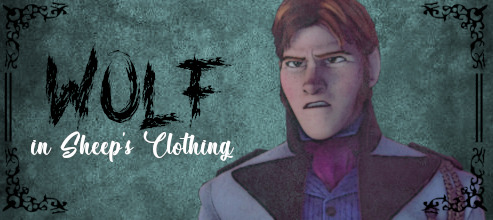
The hints that lead to Hans’ betrayal.
Frozen is iconic for many reasons. The songs, the beautiful story of sisterly love, the fun and well written characters, and of course - the twists. Frozen set up a red herring by making you believe that Anna needed romantic love in order to break her frozen curse, only to reveal that she saved herself by her selfless sacrifice for familial love. But that wasn’t the only twist.
In order to warn their audience about risky relationships, the creators of Frozen came up with Prince Hans; the sociopathic young man that took advantage of the fear running rampant in Arendelle to feed into his sense of entitlement.
Hans is arguably, in my opinion, the greatest Disney villain of all time. He’s unique in the fact that he played the protagonists and the audience, and came very close to succeeding in his plans. However, what others feel about Hans is complicated. Some agree that he’s a great villain, but many feel that his twist came out of nowhere, and that there were no hints that lead to his betrayal. This has led many to come up with claims and theories as to why he suddenly became evil, which I discuss a few of them here.
I’m here to tell you that there were actually quite a few hints, both subtle and obvious, that hinted that Hans was going to turn on Anna when the right opportunity came along. Since this is a fairly longer analysis, I will continue this one under the keep reading tab.
Hint 1: You Can’t Marry a Man You Just Met

One of the biggest indicators that something was wrong in Anna’s choice to marry Hans was the reaction she received from both Elsa and Kristoff. When Elsa hears about it, she has to keep herself from laughing. Then when Anna persists, Elsa proclaims that Anna cannot marry someone she just met. Later on, when Anna is explaining to Kristoff what happened with Elsa, he is much more concerned with Anna telling him that she got engaged to someone she met that day. He goes on the criticize and mock her (playfully), not only here but also later on. This is the most obvious evidence, because both characters feel that Anna is making a very bad choice, and this plot element is pretty much the reason Anna and Elsa fight in the first place. If nothing was to come of this, then it wouldn’t of been mentioned in the first place.
Hint 2: How He Really Feels.

The above scene is very famous for showing how Hans actually feels about Anna’s comment, we finish each other’s sandwiches. Here, we clearly see that he thinks she’s ridiculous. However, its not the only scene that shows his true feelings about Anna.

In this scene, Hans is reacting the Anna’s comment “It’s just me.” To which he laughs, and repeats “Just you?” Jen Lee comments that this was the scene that Hans realized that Anna did not think highly of herself; thus, she was easy to manipulate. However, without the prior knowledge of the interview, we can clearly see his expression here is of curiosity, and almost judgmental or confused. We can see that he finds her lack of self-esteem laughable.

Hans’ comment here is so direct, that even Anna realizes how mean it sounds. Here, Hans tries to defend Anna when she says “I’m completely ordinary!” and he replies with “That’s right, she is.” Although he’s trying to defend her, he pretty much lets slip that he feels she is ordinary and boring; nothing like Elsa.
These three scenes shows us Hans’ opinion of Anna: Ridiculous, laughable, and boring. Basically, he thinks she’s stupid. He cements these feelings in his reveal speech, when he proclaims that Anna was so desperate for love, she made a foolish decision in wanting to marry him, without knowing anything about him.
Hint 3: Drastic Changes in Personality.

One of the staples of people who are sociopaths is their ability to mirror others. Now, everyone has the ability to change their demeanor when they are with certain people. For example, a person will act more mature at work and act more goofy with friends. However, aspects of their original personality will always shine through no matter what. This is not the case for Hans.
For example, when Anna hangs around Elsa for the first time, she tries to act more mature and gentle, but she still seems to second guess and fumble over her words. Same with Elsa; in Frozen 2 Elsa is able to be very collected around nobles, but her more awkward and goofy personality shines through when she accidentally freezes the balcony ledge. Also, while she more comfortable with the people she loves, she is still shy and awkward around them while playing charades.
This is not how Hans is, because he is trying to conceal his true personality. He goes from being goofy and clumsy with Anna, to suddenly mature and vulnerable with Elsa. Then, he drops the nice prince facade all together when the Duke threatens Anna’s image with Arendelle (because this will also put him in a predicament as well). To better explain this, let’s say Hans was truly exactly like Anna. Notice that while Anna also stands up to the Duke, she’s more hesitant and unsure. Hans would be the same way in the scene above. He wouldn’t suddenly start yelling at the Duke and with a confidant and direct demeanor. He would hesitate a bit, maybe even show a bit of regret at what he said. But he doesn’t, and this greatly contradicts who he was trying to be around Anna.
Thus, even if someone doesn't know he’s supposed to be a sociopath, the extreme jumps in personality is very unusual and unsettling.
Hint 4: Subtle Nods

Throughout Frozen there are small, easy to miss on the first viewing, hints that push towards Hans’ betrayal. the above scene is the most famous one, as not only for a small second he has a sinister smile, he is also hinting at what he really wants. In responds to Anna’s “Suddenly I bump into you.” he states “I’ve been searching my whole life to find my own place.” Thus, while Anna is talking about finding him, he is talking about finding Arendelle.
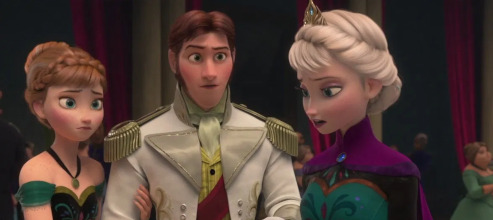
Here, after Elsa just refused to give her blessing, Hans tries to ease Elsa’s suspicions, to which she denies him. Anna’s reaction is sadness, while Hans looks offended. This attitude displayed here, again, contradicts the mature persona he tries to put on in front of Elsa.
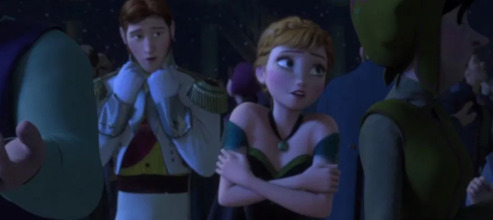
This scene shows off Hans’ more selfish nature. In comparison to Kristoff giving Anna his hat and holding her close to him when she is freezing from the curse, Hans warms himself and is completely oblivious that Anna is much more vulnerable than him in her tiny dress. Honestly, a comparison between Hans’ actions and Kristoff’s actions towards Anna warrants an analysis all on its own, but we’ll save that for another time.

Shortly after the above scene, when Anna announces that she is going to find Elsa on her own, Hans panics. He begs her not go on her own. But When Anna announces that she needs him in Arendelle to watch over it, his expression suddenly changes. He is now strangely happy and honored, and is much more willing to let her go. Now that Anna has given him the power he wanted; he has no real use for her now.

The final subtle hint, is the scene at the Ice Palace. Although Hans at first tries to plea to Elsa to not be a monster, he quickly changes his tune and tries to kill her. He looks up at the chandelier after noticing that the Guard is trying to kill her, and aims the arrow at it; making it seem like her death was accident. Thankfully, Elsa was able to get out of the way in time.
In Conclusion
Hans came to Arendelle in order to court Elsa and become a King. When she was too difficult to reach, he settled for princess Anna, who seemed to be an easier victim to manipulate. He would marry her and then stage an accident for Elsa, making the two of them the ruling monarchs. But with every magical twist and turn that happened, Hans had to adjust his plans accordingly, trying to paint Anna in a positive light and protecting her to ensure his meal ticket. When the dignitaries informed him that if Anna perished Arendelle would fall to him, he was finally able to let his guard down and leave Anna behind. The only thing he didn’t expect was a little magical snowman to ultimately ruin his plans and help Anna stop him. All of this is hinted at throughout the film, and it shows how calculating and manipulative he really is.
#greatqueenanna/analysis#Frozen#Frozen 2#Prince Hans#Trigger Warning: Word: Stupid#I hope you all love my terribly made titles#because they are gonna be a staple of my blog now
110 notes
·
View notes
Text
“The External Source of Energy of the Universe, Origin and Intensity of Cosmic Rays.”

By Nikola Tesla
October 13, 1932, New York:
“A little over one century ago many astronomers, including Laplace still thought that the system of heavenly bodies was unalterable and that they would perform their motions in the same manner through an eternity. But the gradual perfection of instruments and refinement of methods of investigation, achieved since that time, has led to the recognition that there is a continuous change going on in the celestial regions subjecting all bodies to ever varying influence. Where this change is leading to, and what is to be its final phase, have become questions of supreme scientific interest. In a communication to the Royal Society of Edinburgh dated April 19, 1852 and the Philosophical Magazine of October of the same year, Lord Kelvin drew attention to the general tendency in nature towards dissipation of mechanical energy, a fact borne out in daily observation of thermo-dynamic and dynamo-thermic processes and one of ominous significance. It meant that the driving force of the universe was steadily decreasing and that ultimately all of its motive energy will be exhausted none remaining available for mechanical work. In the macro-cosmos, with its countless conception, this process might require billion of years for its consummation; but in the infinitesimal worlds of the micro-cosmos it must have been quickly completed. Such being the case then, according to an experimental findings and deductions of positive science, any material substance (cooled down to the absolute zero of temperature) should be devoid of an internal movement and energy, so to speak, dead.

"This idea of the great philosopher, who later honored me with his friendship, had a fascinating effect on my mind and in meditating over it I was struck by the thought that if there is energy within the substance it can only come from without. This truth was so manifest to me that I expressed it in the following axiom: "There is no energy in matter except that absorbed from the medium.” Lord Kelvin gave us a picture of a dying universe, of a clockwork wound up and running down, inevitably doomed to come to a full stop in the far, far off future. It was a gloomy view incompatible with artistic, scientific and mechanical sense. I asked myself again and again, was there not some force winding up the clock as it runs down? The axiom I had formulated gave me a clue. If all energy is supplied to matter from without then this all important function must be performed by the medium. Yes–but how?
“I pondered over this oldest and greatest of all riddles of physical science a long time in vain, despairingly remind of the words of the poet:
"Wo fass ich dich unendliche Nat—r?
Euch Bruste wo Ihr Quellen alles Lebens
An denen Himmel und Erd— hangt.”
[“Where, boundless nature, can I hold you fast?
And where you breasts? Wells that sustain
All life – the heaven and the earth are nursed. ”]
Goethe. Faust

“What I strove for seemed unattainable, but a kind fate favored me and a few inspired experiments lifted the veil. It was a revelation wonderful and incredible explaining many mysteries of nature and disclosing as in a lightening flash the illusionary character of some modem theories incidentally also bearing out the universal truth of the above axiom.
"When radio-active rays were discovered their investigators believed them to be due to liberation of atomic energy in the form of waves. This being impossible in the light of the preceding I concluded that they were produced by some external disturbance and composed of electrified particles. My theory was not seriously taken although it appeared simple and plausible. Suppose that bullets are fired against a wall. Where a missile strikes the material is crushed and spatters in all directions radial from the place of impact. In this example it is perfectly clear that the energy of the flying pieces can only be derived from that of the bullets. But in manifestation of radio-activity no such proof could be advanced and it was, therefore, of the first importance to demonstrate experimentally the existence of this miraculous disturbance in the medium. I was rewarded in these efforts with quick success largely because of the efficient method I adopted which consisted in deriving from a great mass of air, ionized by the disturbance, a current, storing its energy in a condenser and discharging the same through an indicating device. This plan did away with the limitations and incertitude of the electroscope first employed and was described by me in articles and patents from 1900 to 1905. It was logical to expect, judging from the behavior of known radiations, that the chief source of the new rays would be the sun, but this supposition was contradicted by observations and theoretical considerations which disclosed some surprising facts in this connection.

"Light and heat rays are absorbed in their passage through a medium in a certain proportion to its density. The ether, although the most tenuous of all substances, is no exception to this rule. Its density has been first estimated by Lord Kelvin and conformably to his finding a column of one square centimeter cross section and of a length such that light, traveling at a rate of three hundred thousands kilometers per second, would require one year to traverse it, should weigh 4.8 grams. This is just about the weigh of a prism of ordinary glass of the same cross section and two centimeters length which, therefore, may be assumed as the equivalent of the ether column in absorption. A column of the ether one thousand times longer would thus absorb as much light as twenty meters of glass. However, there are suns at distances of many thousands of light years and it is evident that virtually no light from them can reach the earth. But if these suns emit rays immensely more penetrative than those of light they will be slightly dimmed and so the aggregate amount of radiations pouring upon the earth from all sides will be overwhelmingly greater than that supplied to it by our luminary. If light and heat rays would be as penetrative as the cosmic, so fierce would be the perpetual glare and so scorching the heat that life on this and other planets could not exist.
"Rays in every respect similar to the cosmic are produced by my vacuum tubes when operated at pressures of ten millions of volts or more, but even if it were not confirmed by experiment, the theory I advanced in 1897 would afford the simplest and most probable explanation of the phenomena. Is not the universe with its infinite and impenetrable boundary a perfect vacuum tube of dimensions and power inconceivable? Are not its fiery suns electrodes at temperatures far beyond any we can apply in the puny and crude contrivances of our making? Is it not a fact that the suns and stars are under immense electrical pressures transcending any that man can ever produce and is this not equally true of the vacuum in celestial space? Finally, can there be any doubt that cosmic dust and meteoric matter present an infinitude of targets acting as reflectors and transformers of energy? If under ideal working conditions, and with apparatus on a scale beyond the grasp of the human mind, rays of surpassing intensity and penetrative power would not be generated, then, indeed, nature has made an unique exception to its laws.
"It has been suggested that the cosmic rays are electrons or that they are the result of creation of new matter in the interstellar deserts. These views are too fantastic to be even for a moment seriously considered. They are natural outcroppings of this age of deep but unrational thinking, of impossible theories, the latest of which might, perhaps, deal with the curvature of time. What this world of ours would be if time were curved:
"As there exists considerable doubt in regard to the manner in which the intensity of the cosmic rays varies with altitude the following simple formula derived from my early experimental data may be welcome to those who are interested in the subject.
I = (W+P) / (W+p)
"In this expression W is the weight in kilograms of a column of lead of one square centimeter cross section and one hundred and eighty centimeters length, P the normal pressure of the atmosphere at sea level in kilograms per square centimeter, p the atmospheric pressure at the altitude under consideration and in like measure and I the intensity of the radiation in terms of that at sea level which is taken as unit. Substituting the actual values for W and P, respectively 1.9809 and 1.0133 kilograms, the formula reduces to
I = 2.99421 / (1.9809 + p)
"Obviously, at sea level p = P hence the intensity is equal to 1, this being the unit of measurement. On the other hand, at the extreme limit of the atmosphere p = 0 and the intensity I = 1.5115.
"The maximum increase with height is, consequently, a little over fifty-one percent. This formula, based on my finding that the absorption is proportionate to the density of the medium whatever it be, is fairly accurate. Other investigators might find different values for W but they will undoubtedly observe the same character of dependence, namely, that the intensity increases proportionately to the height for a few kilometers and then at a gradually lessening rate.”

#Nikola Tesla#science#physics#chemistry#history#discovery#cosmic rays#radioactivity#universe#energy#experiments#ahead of his time#ahead of our time
196 notes
·
View notes
Link
To justify Hillary Clinton’s 2016 loss to Donald Trump, leading Democrats and their key media allies for years competed with one another to depict what they called “Russia’s interference in our elections” in the most apocalyptic terms possible. They fanatically rejected the view of the Russian Federation repeatedly expressed by President Obama — that it is a weak regional power with an economy smaller than Italy’s capable of only threatening its neighbors but not the U.S. — and instead cast Moscow as a grave, even existential, threat to U.S. democracy, with its actions tantamount to the worst security breaches in U.S. history.
This post-2016 mania culminated with prominent liberal politicians and journalists (as well as John McCain) declaring Russia’s activities surrounding the 2016 to be an “act of war” which, many of them insisted, was comparable to Pearl Harbor and the 9/11 attack — the two most traumatic attacks in modern U.S. history which both spawned years of savage and destructive war, among other things.
Sen. Jeanne Shaheen (D-NH) repeatedly demanded that Russia’s 2016 “interference” be treated as “an act of war.” Hillary Clinton described Russian hacking as “a cyber 9/11.” And here is Rep. Jerry Nadler (D-NY) on MSNBC in early February, 2018, pronouncing Russia “a hostile foreign power” whose 2016 meddling was the “equivalent” of Pearl Harbor, “very much on par” with the “seriousness” of the 1941 attack in Hawaii that helped prompt four years of U.S. involvement in a world war.
With the Democrats, under Joe Biden, just weeks away from assuming control of the White House and the U.S. military and foreign policy that goes along with it, the discourse from them and their media allies about Russia is becoming even more unhinged and dangerous. Moscow’s alleged responsibility for the recently revealed, multi-pronged hack of U.S. Government agencies and various corporate servers is asserted — despite not a shred of evidence, literally, having yet been presented — as not merely proven fact, but as so obviously true that it is off-limits from doubt or questioning.
Any questioning of this claim will be instantly vilified by the Democrats’ extremely militaristic media spokespeople as virtual treason. “Now the president is not just silent on Russia and the hack. He is deliberately running defense for the Kremlin by contradicting his own Secretary of State on Russian responsibility,” pronounced CNN’s national security reporter Jim Sciutto, who last week depicted Trump’s attempted troop withdrawal from Syria and Germany as “ceding territory” and furnishing “gifts” to Putin. More alarmingly, both the rhetoric to describe the hack and the retaliation being threatened are rapidly spiraling out of control.
Democrats (along with some Republicans long obsessed with The Russian Threat, such as Mitt Romney) are casting the latest alleged hack by Moscow in the most melodramatic terms possible, ensuring that Biden will enter the White House with tensions sky-high with Russia and facing heavy pressure to retaliate aggressively. Biden’s top national security advisers and now Biden himself have, with no evidence shown to the public, repeatedly threatened aggressive retaliation against the country with the world’s second-largest nuclear stockpile.
Congressman Jason Crow (D-CO) — one of the pro-war Democrats on the House Armed Services Committee who earlier this year joined with Rep. Liz Cheney (R-WY) to block Trump’s plan to withdraw troops from Afghanistan — announced: “this could be our modern day, cyber equivalent of Pearl Harbor,” adding: “Our nation is under assault.” The second-ranking Senate Democrat, Dick Durbin (D-IL), pronounced: “This is virtually a declaration of war by Russia."
Meanwhile, Sen. Mitt Romney (R-UT), who has for years been casting Russia as a grave threat to the U.S. while Democrats mocked him as a relic of the Cold War (before they copied and then surpassed him), described the latest hack as “the equivalent of Russian bombers flying undetected over the entire country.” The GOP’s 2012 presidential nominee also blasted Trump for his failure to be “aggressively speaking out and protesting and taking punitive action,” though — like virtually every prominent figure demanding tough “retaliation” — Romney failed to specify what he had in mind that would be sufficient retaliation for “the equivalent of Russian bombers flying undetected over the entire country.”
For those keeping track at home: that’s two separate “Pearl Harbors” in less than four years from Moscow (or, if you prefer, one Pearl Harbor and one 9/11). If Democrats actually believe that, it stands to reason that they will be eager to embrace a policy of belligerence and aggression toward Russia. Many of them are demanding this outright, mocking Trump for failing to attack Russia — despite no evidence that they were responsible — while their well-trained liberal flock is suggesting that the non-response constitutes some form of “high treason.”
Indeed, the Biden team has been signalling that they intend to quickly fulfill demands for aggressive retaliation. The New York Times reported on Tuesday that Biden “accused President Trump [] of ‘irrational downplaying’” of the hack while “warning Russia that he would not allow the intrusion to ‘go unanswered’ after he takes office.” Biden emphasized that once the intelligence assessment is complete, “we will respond, and probably respond in kind.”
Threats and retaliation between the U.S. and Russia are always dangerous, but particularly so now. One of the key nuclear arms agreements between the two nuclear-armed nations, the New START treaty, will expire in February unless Putin and Biden can successfully negotiate a renewal: sixteen days after Biden is scheduled to take office. “That will force Mr. Biden to strike a deal to prevent one threat — a nuclear arms race — while simultaneously threatening retaliation on another,” observed the Times.
This escalating rhetoric from Washington about Russia, and the resulting climate of heightened tensions, are dangerous in the extreme. They are also based in numerous myths, deceits and falsehoods:
First, absolutely no evidence of any kind has been presented to suggest, let alone prove, that Russia is responsible for these hacks. It goes without saying that it is perfectly plausible that Russia could have done this: it’s the sort of thing that every large power from China and Iran to the U.S. and Russia have the capability to do and wield against virtually every other country including one another.
But if we learned nothing else over the last several decades, we should know that accepting claims that emanate from the U.S. intelligence community about adversaries without a shred of evidence is madness of the highest order. We just had a glaring reminder of the importance of this rule: just weeks before the election, countless mainstream media outlets laundered and endorsed the utterly false claim that the documents from Hunter Biden’s laptop were “Russian disinformation,” only for officials to acknowledge once the harm was done that there was no evidence — zero — of Russian involvement.
Yet that is exactly what the overwhelming bulk of media outlets are doing again: asserting that Russia is behind these hacks despite having no evidence of its truth. The New York Times’ Michael Barbaro, host of the paper’s popular The Daily podcast, asked his colleague, national security reporter David Sanger, what evidence exists to assert that Russia did this. As Barbaro put it, even Sanger is “allowing that early conclusions could all be wrong, but that it's doubtful.” Indeed, Sanger acknowledged to Barbaro that they have no proof, asserting instead that the basis on which he is relying is that Russia possesses the sophistication to carry out such a hack (as do several other nation-states), along with claiming that the hack has what he calls the “markings” of Russian hackers.
But this tactic was exactly the same one used by former intelligence officials, echoed by these same media outlets, to circulate the false pre-election claim that the documents from Hunter Biden’s laptop were “Russian disinformation”: namely, they pronounced in lockstep, the material from Hunter’s laptop “has all the classic earmarks of a Russian information operation.” This was also exactly the same tactic used by the U.S. intelligence community in 2001 to falsely blame Iraq for the anthrax attacks, claiming that their chemical analysis revealed a substance that was “a trademark of the Iraqi biological weapons program.”
These media outlets will, if pressed, acknowledge their lack of proof that Russia did this. Despite this admitted lack of proof, media outlets are repeatedly stating Russian responsibility as proven fact.
“Scope of Russian Hacking Becomes Clear: Multiple U.S. Agencies Were Hit,” one New York Times headline proclaimed, and the first line of that article, co-written by Sanger, stated definitively: “The scope of a hacking engineered by one of Russia’s premier intelligence agencies became clearer on Monday.” The Washington Post deluged the public with identically certain headlines:
Nobody in the government has been as definitive in asserting Russian responsibility as corporate media outlets. Even Trump’s hawkish Secretary of State, Mike Pompeo, crafted his accusation against Moscow with caveats and uncertainty: “I think it’s the case that now we can say pretty clearly that it was the Russians that engaged in this activity.”
If actual evidence ultimately emerges demonstrating Russian responsibility, it would not alter how dangerous it is that — less than twenty years after the Iraq WMD debacle and less than a couple of years after media endorsement of endless Russiagate falsehoods — the most influential media outlets continue to mindlessly peddle as Truth whatever the intelligence community feeds them, without the need to see any evidence that what they’re claiming is actually true. Even more alarmingly, large sectors of the public that venerate these outlets continue to believe that what they hear from them must be true, no matter how many times they betray that trust. The ease with which the CIA can disseminate whatever messaging it wants through friendly media outlets is stunning.
Second, the very idea that this hack could be compared to rogue and wildly aberrational events such as Pearl Harbor or the 9/11 attack is utterly laughable on its face. One has to be drowning in endless amounts of jingoistic self-delusion to believe that this hack — or, for that matter, the 2016 “election interference” — is a radical departure from international norms as opposed to a perfect reflection of them.
Just as was true of 2016 fake Facebook pages and Twitter bots, it is not an exaggeration to say that the U.S. Government engages in hacking attacks of this sort, and ones far more invasive, against virtually every country on the planet, including Russia, on a weekly basis. That does not mean that this kind of hacking is either justified or unjustified. It does mean, however, that depicting it as some particularly dastardly and incomparably immoral act that requires massive retaliation requires a degree of irrationality and gullibility that is bewildering to behold.
The NSA reporting enabled by Edward Snowden by itself proved that the NSA spies on virtually anyone it can. Indeed, after reviewing the archive back in 2013, I made the decision that I would not report on U.S. hacks of large adversary countries such as China and Russia because it was so commonplace for all of these countries to hack one another as aggressively and intrusively as they could that it was hardly newsworthy to report on this (the only exception was when there was a substantial reason to view such spying as independently newsworthy, such as Sweden’s partnering with NSA to spy on Russia in direct violation of the denials Swedish officials voiced to their public).
Other news outlets who had access to Snowden documents, particularly The New York Times, were not nearly as circumspect in exposing U.S. spying on large nation-state adversaries. As a result, there is ample proof published by those outlets (sometimes provoking Snowden’s strong objections) that the U.S. does exactly what Russia is alleged to have done here — and far worse.
“Even as the United States made a public case about the dangers of buying from [China’s] Huawei, classified documents show that the National Security Agency was creating its own back doors — directly into Huawei’s networks,” reported The New York Times’ David Sanger and Nicole Perlroth in 2013, adding that “the agency pried its way into the servers in Huawei’s sealed headquarters in Shenzhen, China’s industrial heart.”
In 2013, the Guardian revealed “an NSA attempt to eavesdrop on the Russian leader, Dmitry Medvedev, as his phone calls passed through satellite links to Moscow,” and added: “foreign politicians and officials who took part in two G20 summit meetings in London in 2009 had their computers monitored and their phone calls intercepted on the instructions of their British government hosts.” Meanwhile, “Sweden has been a key partner for the United States in spying on Russia and its leadership, Swedish television said on Thursday,” noted Reuters, citing what one NSA document described as “a unique collection on high-priority Russian targets, such as leadership, internal politics.”
Other reports revealed that the U.S. had hacked into the Brazilian telecommunications system to collect data on the whole population, and was spying on Brazil’s key leaders (including then-President Dilma Rousseff) as well as its most important companies such as its oil giant Petrobras and its Ministry of Mines and Energy. The Washington Post reported: “The National Security Agency is gathering nearly 5 billion records a day on the whereabouts of cellphones around the world, according to top-secret documents and interviews with U.S. intelligence officials, enabling the agency to track the movements of individuals — and map their relationships — in ways that would have been previously unimaginable.” And on and on.
[One amazing though under-appreciated episode related to all this: the same New York Times reporter who revealed the details about massive NSA hacking of Chinese government and industry, Nicole Perlroth, subsequently urged (in tweets she has now deleted) that Snowden not be pardoned on the ground that, according to her, he revealed legitimate NSA spying on U.S. adversaries. In reality, it was actually she, Perlorth, not Snowden, who chose to expose NSA spying on China, provoking Snowden’s angry objections when she did so based on his view this was a violation of the framework he created for what should and should not be revealed; in other words, not only did Perlroth urge the criminal prosecution of a source on which she herself relied, an absolutely astonishing thing for any reporter to do, but so much worse, she did so by falsely accusing that source of doing something that she, Perlroth, had done herself: namely, reveal extensive U.S. hacking of China].
What all of this makes demonstrably clear is that only the most deluded and uninformed person could believe that Russian hacking of U.S. agencies and corporations — if it happened — is anything other than totally normal and common behavior between these countries. Harvard Law Professor and former Bush DOJ official Jack Goldsmith, reviewing growing demands for retaliation, wrote in an excellent article last week entitled “Self-Delusion on the Russia Hack: The U.S. regularly hacks foreign governmental computer systems on a massive scale”:
The lack of self-awareness in these and similar reactions to the Russia breach is astounding. The U.S. government has no principled basis to complain about the Russia hack, much less retaliate for it with military means, since the U.S. government hacks foreign government networks on a huge scale every day. Indeed, a military response to the Russian hack would violate international law . . . .
As the revelations from leaks of information from Edward Snowden made plain, the United States regularly penetrates foreign governmental computer systems on a massive scale, often (as in the Russia hack) with the unwitting assistance of the private sector, for purposes of spying. It is almost certainly the world’s leader in this practice, probably by a lot. The Snowden documents suggested as much, as does the NSA’s probable budget. In 2016, after noting “problems with cyber intrusions from Russia,” Obama boasted that the United States has “more capacity than anybody … offensively” . . . .
Because of its own practices, the U.S. government has traditionally accepted the legitimacy of foreign governmental electronic spying in U.S. government networks. After the notorious Chinese hack of the Office of Personnel Management database, then-Director of National Intelligence James Clapper said: “You have to kind of salute the Chinese for what they did. If we had the opportunity to do that, I don't think we'd hesitate for a minute.” The same Russian agency that appears to have carried out the hack revealed this week also hacked into unclassified emails in the White House and Defense and State Departments in 2014-2015. The Obama administration deemed it traditional espionage and did not retaliate. “It was information collection, which is what nation states—including the United States—do,” said Obama administration cybersecurity coordinator Michael Daniel this week.
But over the last four years, Americans, particularly those who feed on liberal media outlets, have been drowned in so much mythology about the U.S. and Russia that they have no capacity to critically assess the claims being made, and — just as they were led to believe about “Russia’s 2016 interference in Our Sacred Elections” — are easily convinced that what Russia did is some shocking and extreme crime the likes of which are rarely seen in international relations. In reality, their own government is the undisputed world champion in perpetrating these acts, and has been for years if not decades.
Third, these demands for “retaliation” are so reckless because they are almost always unaccompanied by any specifics. Even if Moscow’s responsibility is demonstrated, what is the U.S. supposed to do in response? If your answer is that they should hack Russia back, rest assured the NSA and CIA are always trying to hack Russia as much as it possibly can, long before this event.
If the answer is more sanctions, that would be just performative and pointless, aside from wildly hypocritical. Any reprisals more severe than that would be beyond reckless, particularly with the need to renew nuclear arms control agreements looming. And if you are someone demanding retaliation, do you believe that Russia, China, Brazil and all the other countries invaded by NSA hackers have the same right of retaliation against the U.S., or does the U.S. occupy a special place with special entitlements that all other countries lack?
What we have here, yet again, is the classic operation of the intelligence community feeding serious accusations about a nuclear-armed power to an eagerly gullible corporate media, with the media mindlessly disseminating it without evidence, all toward ratcheting up tensions between these two nuclear-armed powers and fortifying a mythology of the U.S. as grand victim but never perpetrator.
If you ever find yourself wondering how massive military budgets and a posture of Endless War are seemingly invulnerable to challenge, this pathological behavior — from a now-enduring union of the intelligence community, corporate media outlets, and the Democratic Party — provides one key piece of the puzzle.
Update, Dec. 24, 2020, 7:36 a.m. ET: Although the tweets from The New York Times’ Nicole Perlroth referenced above were deleted by her, as indicated, an alert reader notes that a Politico article at the time referenced part of my exchange with her, one prompted by anger from Washington Post reporters over an editorial by their own paper that argued against a Snowden pardon, even though that paper reported extensively on Snowden’s documents and won a Pulitzer for doing so:
The editorial is nothing if not a good excuse for a Twitter debate. Some journalists continued to air outrage yesterday over the editorial board’s defenestration of Snowden, while others either agreed with the board’s argument or at least defended its right to take a stand that it knew would no doubt rankle many in the Post’s newsroom. In one of the more notable exchanges, New York Times reporter cybersecurity reporter Nicole Perlroth tangled with Glenn Greenwald, who broke the Snowden/NSA story for The Guardian.
Perlroth: “Gotta say I agree w/ wapo. @Snowden leaked tens of thousands of docs that had nothing to do with privacy violations.” http://bit.ly/2cLPeLY
Greenwald: “They can start an august club: Journalists In Favor of Criminal Prosecution For Our Sources” http://bit.ly/2cLLIRz
That’s precisely what I was referencing here. It’s utterly repugnant that Perlroth advocated that her own source be imprisoned on the ground that he leaked documents “that had nothing to do with privacy violations” when it was she, Perlroth, who decided to reveal details of NSA spying on China, angering Snowden in the process. Clicking on the above link to her tweet demonstrates that she since deleted it.
One last point: there is an outstanding op-ed in Thursday’s New York Times about anger over the alleged Russian hack by Paul Kolbe, who served as a senior CIA clandestine operative for 25 years and is now director of the Intelligence Project at Harvard Kennedy School, entitled “With Hacking, the United States Needs to Stop Playing the Victim.” It details that “the United States is, of course, engaged in the same type of operations at an even grander scale” and therefore “it’s time for the United States to stop acting surprised and stop posturing.”
5 notes
·
View notes
Text
Devotion Without Religion
Devotion to God has been at the figurative heart of man's religious and spiritual quest for millennia. Saints and texts alike have spoken of man's love for God, God's love for man, and the ecstasy that comes from realizing that love within oneself. But we live in a rational and secular age, and the path of devotion has been de-emphasized. When we admit to having spiritual urges at all, we often speak of the search for peace, with its main route being through meditation. When the emotions are engaged in the spiritual search, they are directed towards aims like self-actualization and healing. Actual devotion—the practice of love, worship, and prayer—is viewed as misguided at best, and dangerous at worst.
It is not at all clear how to reconcile the path of devotion with the independent spiritual path. This is because the way of devotion is associated with the worst aspects of religion, such as irrationalism and fanaticism. The argument goes that only a force like religious devotion is able to lead otherwise intelligent people to embrace the irrational aspects of religion, such as beliefs that contradict mainstream science, or partisanship that rejects or persecutes those who hold differing religious opinions. Therefore, for the modern reformer of spiritual seeking, devotion with its irrational emotional intensity is the force that must be excised when we go to recover what is good about spirituality.
But it's unfair to blame religious devotion for all the problems that the emotions bring to man. On one hand, emotional attachments can lead to fanaticism even without a religious component, as we see in the case of nationalist passion. And on the other hand, as we learn more about man's psychology, we see increasingly that emotional attachments are a key factor that keeps human life and society running. In his treatise The Origins of Political Order, Francis Fukuyama points to research that shows that man was always involved in social and political groupings held together by emotional ties and was never in a solitary state of nature. Modern psychology emphasizes the fact that human relationships are essential for mental health. Even in the hard-nosed field of business management, ever since the publication of In Search of Excellence by Thomas Peters and Robert Waterman, it has been acknowledged that emotional factors like pride in one's work and the joy of serving the customer, as opposed to the rational pursuit of wealth alone, are crucial for success in business.
Therefore, we can't rule out the engagement of the emotions in spirituality solely on the basis of the negative aspects of religion. And while it may seem easier to leave the emotions to the adjacent fields of mental health or business success coaching, the essential connection between engaging the emotions and the search for the Divine cannot be neglected indefinitely. Most people would never be able to undertake an endeavor as difficult as the search for the Divine, not even on the austere path of formless meditation, without a strong emotional connection to the path. And once we admit the possibility of engaging the emotions, we must also admit that deepening that emotional connection to God is one of the most accessible and powerful paths to God.
Devotion to Forms, Abstract and Concrete
The contemporary understanding of God does not allow us to easily see how to do this. Because of the aversion to the religious approach to God, which is caricatured as propitiating a stern old man in the sky, the contemporary tendencies are to either view God as a pure abstraction, a powerful deity but one who is ultimately unknowable in a human way, or otherwise to deny that there is a God in the sense of a conscious being, imagining only an abstract energy. If those two conceptions of God exhausted the reality of God, that still wouldn't necessarily mean that the path of devotion is impossible—after all, such abstractions as a flag, nation, or business organization are all able to command sustained emotional commitment and sacrifice. But it remains true that devotion to tangible forms is a powerful practice—the practice which gives religious devotion its power and which makes the modern spiritual reformer wary.
One interesting thing to note is that just because we find the approach of devotion to concrete forms problematic doesn't make those forms of God any less real. The modern reformer takes God to be an abstract energy because it would be distasteful to worship God in the specific form of Krishna or Christ; but if God really does take the form of Krishna or Christ, the opinions of the modern reformer wouldn't matter. Of course, the modern reformer would hold that there is no specific evidence for God having the form of Krishna or Christ either. Still, if we are open to the idea of devotion at all, we must hold out the possibility of the validity of the recognized forms of God; after all, any argument that discounts the God of specific religious forms could easily be modified to discount the formless and abstract God as well.
But whether we admit traditional forms of God or only abstract forms, the problem for those on the independent spiritual path remains as to how we are to pursue a path of devotion that avoids the trap of the religious approach of exclusivity, irrationalism, and fanaticism. It's hard to see what the options are, but if we are clear eyed we can see that there are only so many possibilities. One is to preserve the old gods of the religions, but to try our best not to get stuck in the religious traps. This approach would acknowledge that there is an unknowable mystique around the forms of God that have been handed down, and that it is not possibly to synthetically come up with a new form or abstraction which can command the same reverence or devotion. In this approach, the heart would be devoted to Christ or Krishna without participating in the other social and institutional structures of organized religion. The danger of this option is that it will slide too far to the faults of the old religious mentality. After all, if the revered forms of God are worth preserving because of their irreplaceable essence, why shouldn't the associated religious practices and social forms be viewed as similarly meritorious? It may not be clear how to extract devotion to these forms of God from concrete religious practice.
A second approach would be to channel devotion to human gurus. There are obvious problems are here as well, and they may even seem to be worse than the problems with the previous option. Namely, this option could lead to personality cults, which are regarded as the worse and more extreme than even religious institutions. If an individual human is loved and regarded as God, they may feel as though they are granted absolute power, which no human being should have. Further, it is not clear whether anyone currently existing on earth is worthy of being placed in this position. What makes this opportunity worth considering, though, is that the human guru provides a target for the devotional impulse that is tangible without relying only on the classical forms of the religions. And in an ideal world, there might be enough spiritual masters and gurus that would make this a legitimate outlet for the devotional impulses of the spiritual seekers.
A third approach would be to reserve the devotional impulse for the forms and institutions of human life as they are: the family, the nation, various secular and religious institutions. This approach would powerfully ground spiritual seeking in the structures of everyday life. The problem with this approach is that even though the human affections can work effectively through these human organizations, it is not clear if the highest form of religious devotion could flow through these mundane channels. A fourth option would be not to try to send the religious devotional impulse towards any forms or structures at all, and instead to focus on revering the abstract forms of God instead. This approach would seem to at least avoid the problems of the earlier methods in principle, though in practice one may wonder if the human heart could really love an abstraction. The modern reformer or critic may hold that any effectiveness of the concrete forms for devotion is still too big of a risk, and that man will have to learn to love the abstract. But it must be noted that even movements with aniconic policies or tendencies have had trouble with fanaticism.
It may seem like there are no good options for how to safely direct the devotional impulse: either there is the option of a cold abstraction that doesn't inspire devotion, or otherwise the problems that come with emotional attachments to people, forms, or institutions that are not fit to bear the pressure of being loved as God. But there is a subtle shift of framing we can use to open another option. In options one through four, we assumed that we were disconnected from God and needed to find the right way to connect with him; if we didn't find it, we might be disconnected forever. In this way of thinking, the old religions may have had a channel through their various forms, and if we can't use their channel as it was initially set up, we could lose access to God completely.
But we don't need to make that assumption. We can assume instead that we already have a relationship with God, and from there assume that we will be guided to the right devotional channels when the time is right. This is a fifth, all-encompassing option that gives us not a simple answer for how we should direct our devotional impulse but rather a way of living that will dynamically channel our devotion. The specific devotional forms may be different at different times; and they may include some of the options from above that may seem "dangerous" for their proximity to religious methods, such as the use of older religious forms of God, devotion to human spiritual teachers or institutions, or the sanctification of human relationships like the family, romantic love, or friendship. But as long as we keep in mind that our relationship with God is prior to any given form of him that we are devoted to, we will be relatively safe as we negotiate the shifting tendencies of devotional spiritual practice.
A Devotional Relationship to God
The possibility of a devotional practice in the contemporary era requires that we have a relationship with God that is prior to any specific form of God, and use that as a basis for devotional relationship to various forms of God. But what is this relationship with God? This may seem like an impossible query. How can a human have a relationship with God, the creator of the entire universe? We are used to relationships with our fellow humans; these relationships are characterized by mutual support, or antagonism, or indifference. Assuming God is a real being, we have a relationship with Him, just as we have relationships with our fellow humans on Earth; if it doesn't seem like we have a relationship with Him, that just means that our relationship is characterized by ignorance, or perhaps worse, indifference, just as so many of our relationships with humans are.
The first step to improving this relationship is to acknowledge that God exists and try to be more open to Him. The first step in improving a human relationship is to listen more, to be more attentive; so it is with God. We do this by being quiet and listening for what God has to say to us. But what if God says nothing? In that case, we might feel that our relationship with Him is characterized by abandonment—as with a child whose father or mother has left. In an adult relationship with God, though, there can be no question of abandonment; we must realize that the issue is not with us or with God but with the limits of our human finitude, our ability to hear. So if God seems quiet, we must trust and wait for His voice to be heard more clearly, whether that takes a day, or a week, or even many years. A relationship with God must take into account the type of being that God is, which means understanding God as a being that works on timescales that are vaster than ours are; we cannot be upset if he doesn't immediately answer us as we might expect a human relationship partner to return our texts and calls on the same day. The relationship with God is not a relationship between humans but rather a relationship between a human and the all-powerful, all-knowing, and all-loving creator of the universe. We must trust his timing, and we must trust that the circumstances he arranges for us are the best ones for us to be in.
We must be present in our relationship with God just as we stay present in a relationship with a human, being open and listening and staying connected; only then does the possibility of insight and trust open up. We don't need to start with trust—we simply need to start with staying connected. As we communicate and listen, the forms that we need to interact with God will be suggested, whether these are human relationships in our life that are symbols of the Divine, or are ancient forms of the Divine that have been revered through the ages and find a renewed relevance for us, or are the beloved forms of spiritual teachers that come into our lives. By following the path that opens up, we find the forms that are needed to practice the path of devotion. Even in this modern era that has identified the problems with religion without providing a replacement, if we trust the spiritual path that unfolds, the heart will still be able to fulfill its desire for the Love of the Divine.
1 note
·
View note
Link
American conservatism—the so-called “culture of life”—worships annihilation.
A decade ago, in my first public writing since leaving Capitol Hill, I warned that the Republican Party, in its evolution towards an extremist conservative movement allied with extremist Christian fundamentalism, was becoming like “one of the intensely ideological authoritarian parties of 20th century Europe.” After Donald Trump’s enthronement as the decider of our fate, I analyzed the GOP’s descent into a nihilism that belied every one of its supposed “values.” They value only absolute power or ruin.
It is now long past time to cast off highfalutin’ Latinisms and simply call the Republicans and their religious and secular conservative allies what they are, and in unadorned English: a death cult. As the country reels from the coronavirus pandemic, our national government might just as well be run by the infamous People’s Temple of Jonestown.
By now we are benumbed by the all-pervasive arguments over relaxing workplace shutdowns and stay-at-home orders due to coronavirus. In any sane society, the issue would be how to institute the most efficient measures to defeat the pandemic in the shortest time and with the lowest loss of life. Instead, Trump and his merry band of lunatics have hijacked the national debate into a faux-serious discussion of when, oh, please, how soon, can we “reopen the economy?” Naturally, the media gamely continue to play along with this calculated bit of dezinformatsiya.
This has led to extreme callousness, like that shown by Texas lieutenant governor Dan Patrick, who opined that grams and gramps should be eager to shuffle off this mortal coil for the sake of their grandchildren.
There is abundant empirical evidence against this notion: voters in Florida, known as “God’s waiting room” for its geriatric population, are notoriously averse to paying one cent in state income tax to fund education or child health, let alone lay down their lives. In any case, the 69-year-old Patrick, who claims he’s willing to die for his proposition, did not relinquish the burdens of his office to volunteer as an emergency room orderly.
The whole extremely well-funded edifice of “economic conservatism” is equally a death cult, worshiping Mammon so fervently that it is eager to make human sacrifice upon its altar, just like the Mayans and Carthaginians.
There’s also Congressman Trey Hollingsworth of Indiana, who put a patriotic gloss on his Malthusianism, decreeing that “it is always the American government’s position to say, in the choice between the loss of our way of life as Americans and the loss of life, of American lives, we have to always choose the latter.”
Then, striking the pose of the Serious Adult in the Room correcting mischievous children, he intoned: “It is policymakers’ decision to put on our big boy and big girl pants and say it is the lesser of these two evils.” This encapsulates the stereotype of the economic conservative: Dickens’s Thomas Gradgrind, the rigid, condescending, and heartless pedagogue.
But some pronouncements from the Trump coalition offer more ethereal rationalizations than the mere pursuit of lucre. The news is replete with stories about evangelical ministers packing their megachurches like sardine cans in defiance of state orders for social distancing, as well as contempt for common sense.
We all know about that harebrained medicine man in Louisiana, Tony Spell, already arrested for violating the state’s prohibition of large gatherings, who continues his antics nonstop. Spell, who sounds as socially responsible as a blood tick, is proclaiming his parishioners ought to choose death: “Like any revolutionary, or like any zealot, or like any pure religious person, death looks to them like a welcome friend. True Christians do not mind dying. They fear living in fear.”
So much for fundamentalists’ vaunted “culture of life,” a slogan which the prestige media never presume to critique.
For a more socially upscale version of this sentiment, let us turn to First Things, a pretentious journal of alleged theology that dresses up its non-stop shilling for the GOP with high-toned words like “numinous” and references to the philosopher Erasmus.
Last month, its editor, R.R. Reno, wrote a piece called, “Say No to Death’s Dominion.” It is an extraordinary performance. Contrary to the title, he actually argues that death should be embraced. He does this by weaving an imbecilic theology that includes falsifying the history of the 1918 flu epidemic to make his basic point:
“In our simple-minded picture of things, we imagine a powerful fear of death arises because of the brutal deeds of cruel dictators and bloodthirsty executioners. But in truth, Satan prefers sentimental humanists. We resent the hard boot of oppression on our necks, and given a chance, most will resist. How much better, therefore, to spread fear of death under moralistic pretexts.”
Oh, I get it! So Mother Teresa and Dorothy Day were more depraved than Josef Stalin! Reno ends with this:
“Fear of death and causing death is pervasive—stoked by a materialistic view of survival at any price and unchecked by Christian leaders who in all likelihood secretly accept the materialist assumptions of our age. “
This insane rant against materialism would seem to contradict the crassly materialistic assumptions underlying economic conservatives’ advocacy for letting a deadly virus “wash over” the population, as Trump would say. But these views, at first sight blatantly opposed, can be reconciled.
And who better to reconcile God and Mammon than a grifter like Jerry Falwell, Jr., ringmaster of Liberty University and testifier to Donald Trump’s status as an emissary of the Almighty? Not only has Falwell continued the school year, virtually alone among American universities, and despite pleading from students and parents to close, he has now been sued for failing to refund fees for student activities that have been suspended.
Fundamentalist preachers’ love of money is no secret: it is only by packing churches that the collection plate will yield a bounteous harvest so that their missionary work can continue – perhaps logistically aided by the purchase of a $65-million Gulfstream executive jet. And why not? It would upstage Pat Robertson, who had a mere Learjet, and a rental at that.
Political observers often wonder about the bizarre conservative coalition of plutocrats and theocrats, believing it to be unstable. But the intersection of the heartless pecuniary motives of religious and economic conservatives is no coincidence. And beneath the Ebenezer Scrooge façade of economic conservatives is the same kind of perverted idealism that we see in Tony Spell or R.R. Reno.
The most cost-efficient industrial process is one that wastes the fewest resource inputs. Likewise, internal combustion engines have evolved to get better mileage even as they pollute less. And electric motors are even more fuel efficient and less polluting.
So how do we explain conservatives’ perverse hatred of the environment, even when there are no profits at stake, as well as their tenacious denial of climate change in the face of irrefutable data? Is it not much the same as the Bible thumper who bitterly condemns stewardship of the environment as Gaia worship?
There are other similarities. Since the 1970s oil shocks (and coincident with the rise of the New Right), an abiding feature on the American scene has been the survivalist, hoping for the national Götterdämmerung that will vindicate his having stockpiled 10,000 rounds of ammunition and a horde of Krugerrands. This dovetails with fundamentalists’ weird enthusiasm for the prospect of world annihilation that animates belief in the Rapture, the only difference being the technique by which the elect avoid the mass slaughter.
Firearms fetishism and a fascination with violence, war, and armed insurrection are also mainstays of right-wing ideology, hardly distinguishable from Jerry Falwell Sr.’s, proclamation that God is Pro-War. And how about the Ultimate Fighting Jesus? The NRA neatly intersects with “muscular Christianity,” revealing both ideological kinship and some very embarrassing gender insecurities that frequently irrupt in misogyny and homosexual panic.
There is no longer the slightest doubt in any sane person’s mind that not only are the GOP’s fundamentalist-extremist religious allies a death cult disguised as 501(c)3 tax-exempt charitable organizations. The whole extremely well-funded edifice of “economic conservatism” is equally a death cult, worshiping Mammon so fervently that it is eager to make human sacrifice upon its altar, just like the Mayans and Carthaginians.
“¡Viva la Muerte!”
“Long live death!” That was the defiant cry of José Millán-Astray y Terreros, a general in Francisco Franco’s fascist army during the Spanish civil war. It could just as well suit Trump’s foot soldiers.
- Mike Lofgren is a former congressional staff member who served on both the House and Senate budget committees. His books include: “The Deep State: The Fall of the Constitution and the Rise of a Shadow Government“ and “The Party is Over: How Republicans Went Crazy, Democrats Became Useless, and the Middle Class Got Shafted.”
21 notes
·
View notes
Text
Extremist Traits & TERFs
The traits are taken from (here), which is a list of extremist traits by Laird Wilcox. Most examples are from interactions with people on this blog, because I’ve got to limit myself to something.
Character Assassination
“Extremists often attack the character of an opponent rather than deal with the facts or issues raised. They will question motives, qualifications, past associations, alleged values, personality, looks, mental health, and so on as a diversion from the issues under consideration”
TERF Examples: Character attacks on Susie Green, of Mermaids UK, to attempt to imply that her motive for Mermaids UK is to force her own child to transition. & Claiming Mermaids UK was a significant part of forcing a young UK child to be trans, when in fact he was being abused by his mother and Mermaids UK only ever were contacted by phone by the mother, and were not otherwise involved in any way.
Name-Calling and Labelling
“Extremists are quick to resort to epithets (racist, subversive, pervert, hate monger, nut, crackpot, […] and so on) to label and condemn opponents in order to divert attention from their arguments and to discourage others from hearing them out. These epithets don’t have to be proved to be effective; the mere fact they have been said is often enough”
TERF Examples: "pedophile apologist”, “infertile, fat white loser”, “rapist” (all directed at me!)
Irresponsible Sweeping Generalisations
“Extremists tend to make sweeping claims or judgements on little or no evidence, and they have a tendency to confuse similarity with sameness […] they assume that because two (or more) things, events, or persons are alike in some respects, they must be alike in most respects.”
TERF Examples: “trans women are just men”; use of crimes by cis men to attempt to demonstrate trans criminality
Inadequate Proof For Assertions
“Extremists tend to be very fuzzy about what constitutes proofs, and they also tend to get caught up in logical fallacies […] they tend to project wished-for conclusions and to exaggerate the significance of information that confirms their beliefs while derogating or ignoring information that contradicts them.”
TERF Examples: “This research is reliable because I agree with it, and I don’t care that the authors have deliberately published politically motivated anti-gay propaganda studies before”
Advocacy of Double Standards
“Extremists generally tend to judge themselves or their interest groups in terms of their intentions, which they tend to view very generously, and others by their acts, which they tend to view very critically. They would like you accept their assertions on faith, but they demand proof of yours. They tend to engage in special pleading on behalf of themselves or their interests, usually because of some alleged special status, past circumstances, or present disadvantage.”
TERF Example: Refusal to criticise WoLF + Julia Beck’s association with the Heritage Foundation due to presumed good intentions
Tendency to View Their Opponents and Critics As Essentially Evil
“To the extremist, opponents hold opposing positions because they are bad people […] not merely because they simply disagree, see the matter differently, have competing interests, or are perhaps even mistaken.”
TERF Example: I deserve to “rot in hell” because I don’t agree with TERFs
Manichaean Worldview
“Extremists have a tendency to see the world in terms of absolutes of good and evil, for them or against them, with no middle ground or intermediate positions. All issues are ultimately moral issues of right and wrong, with the ‘right’ position coinciding with their interests.”
TERF Example: Willingness to use and spread sources from the alt-right with no regard for the source, since if it coincides with their interest, it’s ‘right’
Advocacy Of Censorship or Repression of Their Opponents or Critics
“They may include a very active campaign to keep opponents from media access [… or] actually lobby for legislation against speaking, writing, teaching, or instructive ‘subversive’ or forbidden information or opinions.”
TERF Example: Pressure to isolate young trans teens from media access
Tend to Identify Themselves In Terms Of Who Their Enemies Are
“[E]xtremists may become emotionally bound to their opponents, who are often competing extremists themselves. Because they tend to view their enemies as evil and powerful, they tend, perhaps subconsciously, to emulate them, adopting to same tactics to a certain degree.”
TERF Example: "TRA’s”, “libfems”, “transcult”; emulating anti-feminist tactics by joining groups like Hands Across The Aisle to directly partner with anti-abortion, anti-feminist conservatives and divide-and-conquer
Tendency towards argument by intimidation
“Extremists tend to frame their arguments in such a way as to intimidate others into accepting their premises and conclusions. […] They use a lot of moralising, pontificating, and tend to be very judgemental. This shrill, harsh rhetorical style allows them to keep their opponents and critics on the defensive, cuts off troublesome lines of argument, and allows them to define the perimeters of debate.”
TERF Example: Using the words “trans women” and “literal pedophiles and rapists” interchangeably in arguments
Use of Slogans, Buzzwords, and Thought-Stopping Cliches
“For many extremists, shortcuts in thinking and in reasoning matters out seem to be necessary in order to avoid or evade awareness of troublesome facts and compelling counter-arguments. Extremists generally behave in ways that reinforce their prejudices and alter their own consciousness in a manner that bolsters their false confidence and sense of self-righteousness.”
TERF Examples: “Peak trans”, “autogynephiles”, the bathroom & prison rapist tropes, to discredit trans women; “handmaids” and “libfems” to discredit cis women who disagree with them
Assumption of Moral or Other Superiority over Others
“Most obvious would be claims of general racial or ethnic superiority […] Less obvious are claims of ennoblement because of alleged victimhood,”
TERF Examples: Expanding real victimisation of women to include historically inaccurate concepts, such as ‘witch hunts were methods of controlling women’s knowledge’ to increase superiority; complete disownment of any moral responsibility for violence perpetrated or encouraged by TERFs
Doomsday Thinking
“Extremists often predict dire or catastrophic consequences from a situation or from failure to follow a specific course, and they tend to exhibit a kind of ‘crisis-mindedness’. It can be a Communist takeover, a Nazi revival, nuclear war, earthquakes (… etc. …) Whatever it is, it’s just around the corner unless we follow their program and listen to the special insight and wisdom, to which only the truly enlightened have access.”
TERF Example: Fair Play For Women’s unrealistic theory that if Gender Recognition Certificates were easier to get, women’s prisons would be flooded with trans sex offenders instantly.
Belief that it’s okay to do bad things in service of a good cause
“Extremists may deliberately lie, distort, misquote, slander, defame, or libel their opponents or critics, engage in censorship or repression, or undertake violence in “special cases”.”
TERF Example: Wetmeadow ‘distorting’ my post on the cotton ceiling to imply that I was saying same-sex attraction is a mental illness, to discredit me.
Emphasis on Emotional Response (and less on logical analysis and reasoning)
“Extremist have an unspoken reverence for propaganda, which they may call ‘education’ or ‘consciousness-raising’. Symbolism plays an exaggerated role in their thinking and they tend to think imprecisely and metamorphically.”
TERF Example: ‘consciousness-raising’ has a long history in extreme radfem spaces; in recent online spaces it’s more often called ‘peak trans’.
Hypersensitivity and Vigilance
“Extremists perceive hostile innuendo in even casual comments; imagine rejection and antagonism concealed in honest disagreement and dissent; […] Although few extremists are clinically paranoid, many of them adopt a paranoid style with its attendant hostility and distrust.”
TERF Example: Exposinglesphob’s entire blog
Problems Tolerating Ambiguity and Uncertainty
“[T]he ideologies and belief systems to which extremists tend to attach themselves often represent grasping for certainty in an uncertain world, or an attempt to achieve absolute security in an environment that is naturally unpredictable […] Extremists exhibit a kind of risk-aversiveness that compels them to engage in controlling and manipulative behaviour, both on a personal level and in a political context.”
TERF Example: “What do you mean, someone’s gender or sex might be ambiguous?? Woman is a biological term for adult human females, it’s simple”
Inclination towards “GroupThink”
“‘Groupthink’ involves a tendency to conform to group norms and to preserve solidarity and concurrence at the expense of distorting members’ observations of facts, conflicting evidence, and disquieting observations [… Extremists may] only talk with one another, read material that reflects their own views, and can be almost phobic about the ‘propaganda’ of the ‘other side’. The result is a deterioration in reality-testing, rationality, and moral judgement.”
TERF Example: Any source I give is bad, even if they’re genuinely trying to say that wikipedia is ‘good research’.
Tendency to Personalise Hostility
“Extremists often wish for the personal bad fortune of their ‘enemies’ and celebrate when it occurs.”
TERF Example: The fact that pretty much every person who isn’t a TERF and who discourses has been told to kill themselves.
Extremists often feel that the system is no good unless they win
“If public opinion turns against them, it was because of ‘brainwashing’. If their followers become disillusioned, it’s because of ‘sabotage’.”
TERF Example: Ex-terfs like myself either are just too dumb to understand radical feminism, or we never even existed in the first place.
273 notes
·
View notes
Text
Reunion: Shadows at High Noon
McCree: This is all your fault, Reyes!
Reyes: I’m never gonna hear the end of this, am I?
McCree: I’m sure I’ll get over it…eventually.
Reyes: Good. Because I’m gonna need you, Jesse.
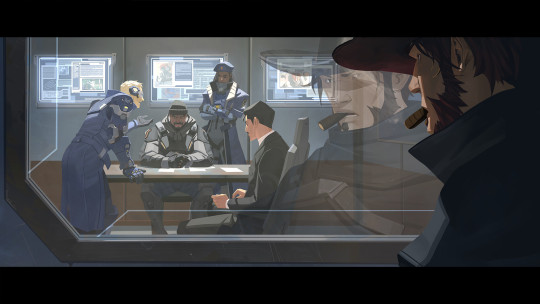
---
Ashe: …Jesse McCree. Been awhile. You promised you’d write.
McCree: Well, Ashe…I’ve been kinda busy.
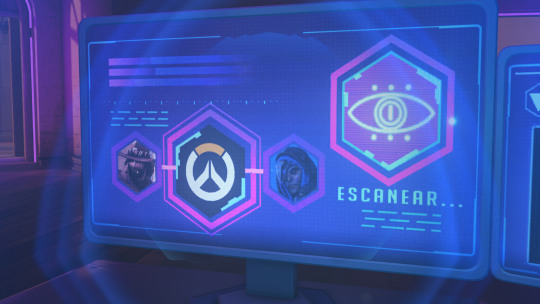
---------
Sombra has always been a core component of the “Reaper is a double-agent looking to enact retribution on Talon” theory (or “Masquerade theory”, if you want a snazzier name) - in fact, I’d argue that Sombra is the core component of the theory. While most of my analytical content in the last year has really focused a lot on Gabriel Reyes/Reaper, Moira, Jack Morrison/Soldier: 76, Akande Ogundimu/Doomfist, Talon, and their respective connections to Retribution, Sombra has never stopped being relevant to the discussion. If anything, she is the network, the axis, the center that keeps it all together.
And that is a pretty literal description of her and her role.

In most of these posts, I’ve avoided discussing McCree directly because, well, there simply wasn’t as much evidence about his connections to the “masquerade” that Reaper, Sombra, and likely Soldier: 76 and Ana are playing with Talon. Prior to “Reunion,” this is the evidence we had that McCree was at least on Sombra’s radar:

A picture of him along with a picture of Jack Morrison in Sombra’s room.
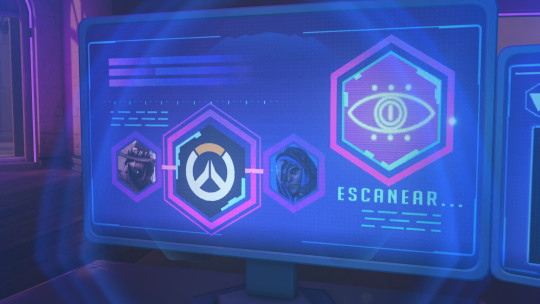
An image of him connected to Overwatch and Ana (who is unmasked, by the way), and the word “Escanear” (Scan).
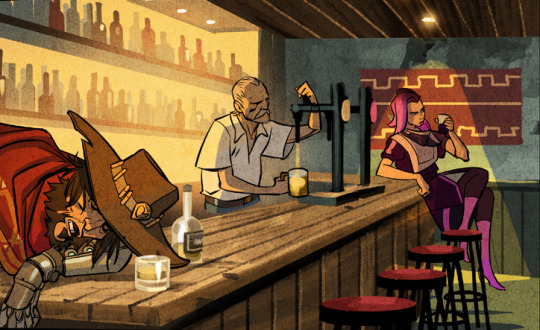
And a comic panel of him maybe meeting Sombra at the Calaveras bar in the Castillo area of Dorado.
Granted, this isn’t poor evidence by a long shot. The evidence around Soldier: 76 and Ana is much more ephemeral, but with logic, there’s enough ways to sleuth through the contradictions and outright lies by Reaper and Soldier: 76 to deduce that there is something going on (again, this says nothing about how much Soldier: 76 and Ana approve of Reaper and Sombra’s plan, just that they’re aware of it in the present (Recall-Masquerade-era)).
The last piece of evidence that seemed to hint at McCree’s role in the Recall-Masaquerade-Searching-era was a key interaction from Retribution:
McCree: This is all your fault, Reyes!
Reyes: I’m never gonna hear the end of this, am I?
McCree: I’m sure I’ll get over it…eventually.
Reyes: Good. Because I’m gonna need you, Jesse.
---
The final line by Reyes certainly implies he had plans for McCree after the Venice Incident - that he would need McCree to do some sort of work for Blackwatch...and for Overwatch as a whole. However, it was hard to say exactly what Reyes had in mind. For example, it could be argued that Reyes anticipated more openly aggressive moves by Talon or other extremist groups, such as Null Sector:
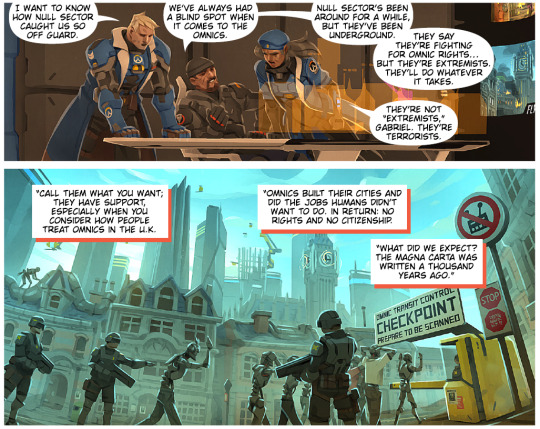
And we know that he specifically used McCree as the agent to sneak into the hot zone of London and get ground-level views and images of the situation.
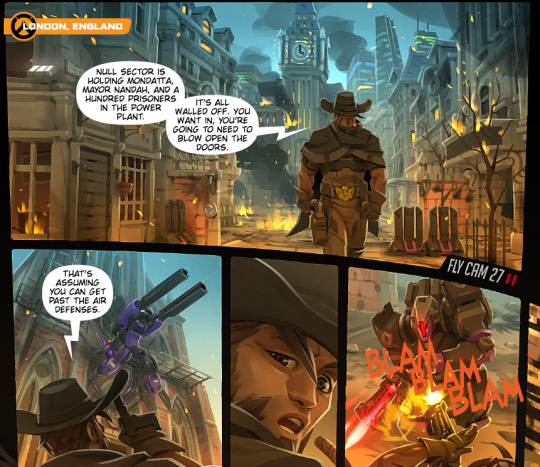
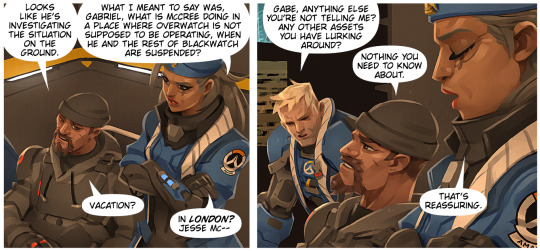
But with “Reunion”, we now have much more overt evidence that McCree is “up to something” -
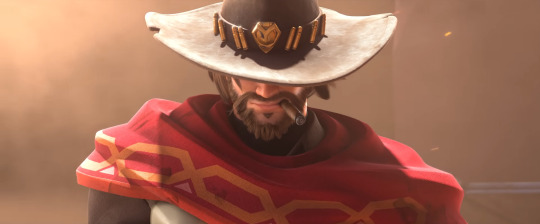
That “something” being that he’s actually doing work either for Reaper (through Sombra) or following Sombra’s own objectives.
(An extremely long post under the cut.)
(TL;DR: Jesse McCree appears to still be operating under a set of mission orders from either Gabriel Reyes himself, or he is cooperating with Sombra who is effectively coordinating former members of Blackwatch (such as McCree and Reaper) and Overwatch (Soldier: 76 and Ana Amari/“The Shrike”) either on her own terms or on her own “objectives” that she was given by Reyes. While no specific parts are set in stone, the story of Overwatch is implying that Sombra is running a massive network of coordinated roles between characters like Reaper, Soldier: 76, Ana Amari, possibly Zarya and/or Symmetra, and Jesse McCree himself.)
Again, this says very little about how much McCree approves of the plan, just that he’s in on it. Like all of Sombra’s relationships - canon or implied - there’s a level of ambiguity about how much each character fully trusts her, how much they want to work with her, and if there’s some sort of compromising, deal-making, or blackmailing going on.
Personally, I believe that all the characters Sombra is connected to - canon or implied - are willingly working with her. Michael Chu’s exact statement on how Reaper “views” Sombra is that he knows she is “effective” at what she does, which is a part that has three main roles.
The first role Sombra has is:
Reaper: Try to stick to the plan, Sombra.
Sombra: Look, someone has to be ready when all your careful planning doesn't pan out.
Be his backup.
You know.
In case he gets himself trapped again.
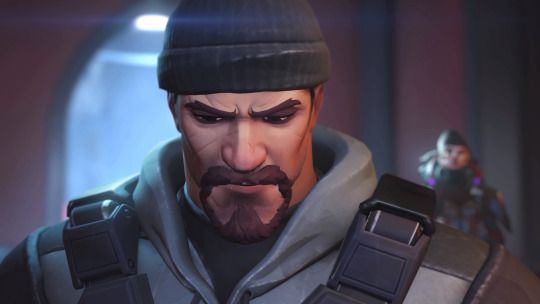
The second:
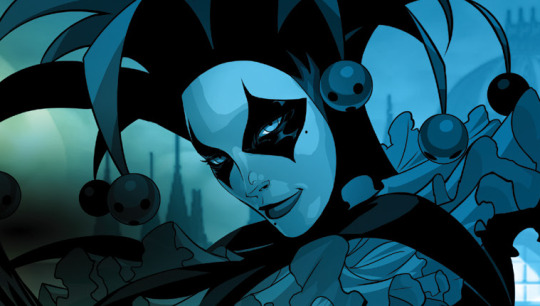
Play “the fool” to Reaper’s “loyal commander” act.
By this, I mean that Sombra provides the “distraction.” Like any good “smoke and mirrors” act, Sombra is the distraction for Talon members to focus on while they start to increasingly rely on Reaper and continue to pull him into the fold and chain of command. By pretending to undermine each other, Sombra and Reaper do a tactical sleight of hand on the other Talon members to effectively boost Reaper through the ranks while still passing information to Sombra herself. Both Sombra and Reaper achieve what they want while still being able to cover each other’s back should something go wrong (you know, like Point 1 above).
Sombra does this role very -

Very -
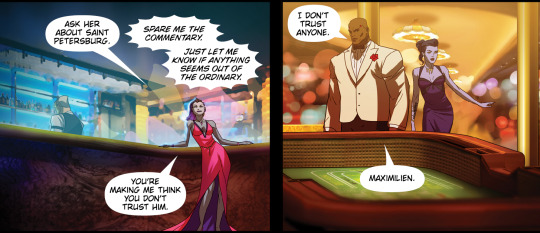
Very -
Sombra: Isn't it a little embarrassing to get beaten up by a monkey? Doomfist: Have you ever been hit by a giant, genetically engineered gorilla? I could arrange it for you...
---
Moira: Started any wars lately? Sombra: I'd have to check my schedule.
---
Sombra: Ah, my favorite spider. I wonder what sort of web you're spinning now. Widowmaker: It'd be a shame if something happened to you on our next mission. A real pity.
---
Very well.
Note how in the second image shown that Sombra says, “You’re making me think you don’t trust him,” and Doomfist immediately replies with, “I don’t trust anyone.” It’s pretty clear the implication of his words are directed towards Sombra herself (though we miss whatever her reaction is), but this is followed up with the in-game interactions between Sombra, Doomfist, Moira, and Widowmaker, which makes it much more blatant that no one in Talon trusts her, but that she’s too “effective” to not work with.
(Additionally, note how different her interactions with Reaper are:)
Sombra: What are we doing today, Gabe? You don't mind if I call you 'Gabe,' do you? Reaper: Stick to the mission. --- Reaper: Try to stick to the plan, Sombra. Sombra: Look, someone has to be ready when all your careful planning doesn't pan out. --- (On Oasis) Sombra: So what are we doing here, boss? Reaper: I need to pay a visit to a friend. (Moira)
---
Reaper “tolerates” Sombra much better than the other Talon characters, which again, plays back into their dual-roles of the masquerade they’re playing.
The third role that has been hinted at but not shown outright in canon story events or materials is:

Sombra’s “network.”
Again, while this isn’t shown or stated outright, there are too many details in-game and in the comics that show Sombra having connections with at least three other characters: Soldier: 76 (Jack Morrison), The Shrike (Ana Amari), and Jesse McCree. This is partially due to Sombra being the “ultimate plot convenient” role and also due to actual canon which demonstrates she’s been in contact with certain people.
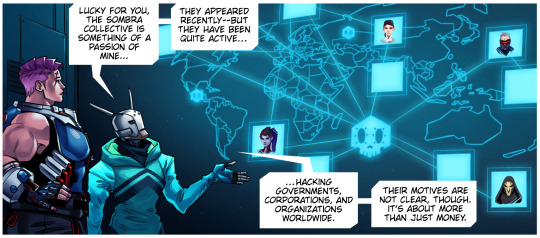
Lynx-17 knows that Sombra has an established connection with Soldier: 76, though they do not seem to be fully aware of Sombra’s connections to Ana (probably because Lynx doesn’t realize Ana is still alive and is hiding as The Shrike).
In-game, both Sombra’s room and the Necropolis are littered (quite literally) with evidence that implies Sombra is managing a network of rogue Overwatch and Blackwatch agents (again, to stress, this does not imply how much anyone likes working with her).

She knows who Jesse McCree and Jack Morrison are.

She knows Ana’s masked persona of “The Shrike.”
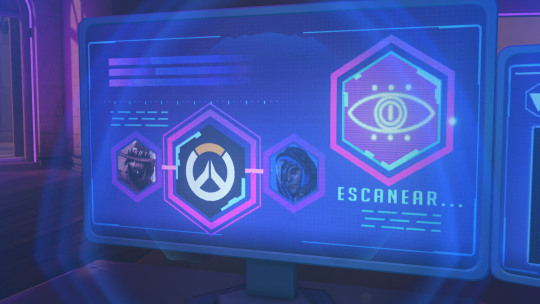
She appears to either be establishing or facilitating connections between McCree and Ana.
And on Necropolis:

She’s giving Soldier: 76 and Ana updates on Reaper’s movements.
Note that since the Necropolis map was made before “Masquerade” was released, Reaper’s (and Sombra’s) visit to Venice isn’t included in the map. However, the other locations all have actual events or connections to them:
Los Angeles, California: “Reflections”
Numbani, Nigeria: either the “Museum Heist” or retrieving Doomfist from prison
Watchpoint: Gibraltar: “Recall”
Oasis, Iraq: visiting Moira’s lab
Volskaya Industries in St. Petersburg, Russia: “Infiltration”
Again, the game makes it pretty clear that Sombra is the one doing this.
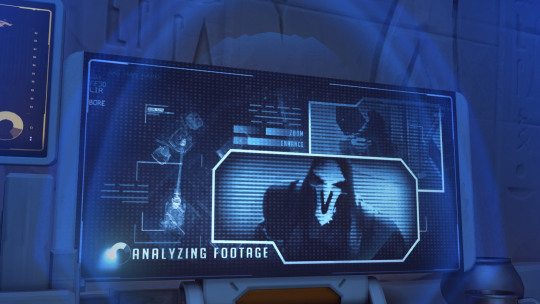
All the shots are from “Infiltration”.

This exact shot is from Sombra’s perspective.
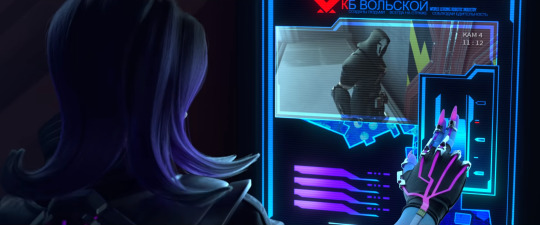
(She might even be sending Jack and Ana live footage from the Volskaya mission.)
Like I said above, it’s easier to logic out that Sombra is working with Soldier: 76 and Ana than it is that she’s working with McCree directly. So much of Overwatch’s in-game details of environmental storytelling are tantalizing and imply a significant amount, but rarely do they show anything super concrete.
For example:
Does Sombra know who McCree is?

Yes, she does. We can say this with certainty.
Is she working with McCree?
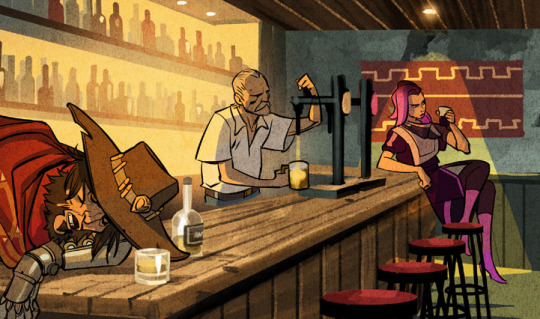
Prior to “Reunion” the answer to this would have been “I can’t really say one way or the other.”
But then “Reunion” came out.
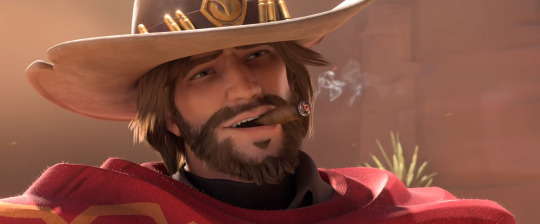
And the evidence got much more overt.
---------
On the fringes
Like the Recall-Masquerade-era Soldier: 76 plotline, the implications of Sombra’s work and information is easier to suss out when we work through “Reunion” logically.
In Soldier: 76′s plotline, there are numerous gaps where the easy answer to the questions are “Well, Sombra.”
How did he know Ana was “The Shrike”?

Well, Sombra.
How did he possibly coordinate “the trap” with Reaper to lure Ana out of hiding (to come protect him)?
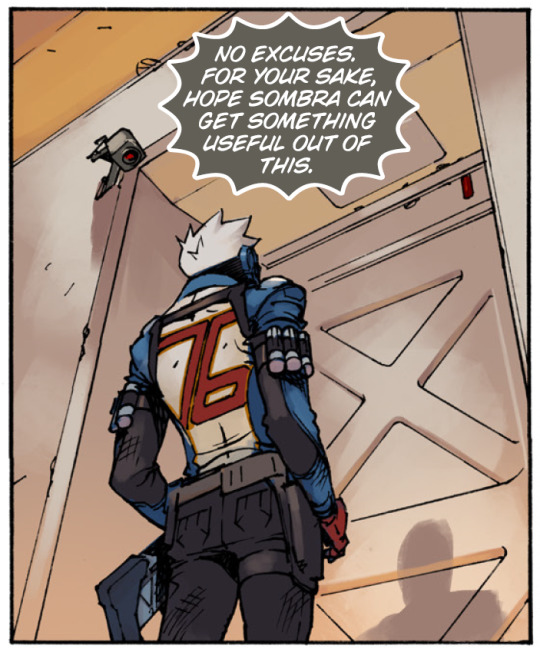
Well, Sombra.
Why would he and Sombra work together?
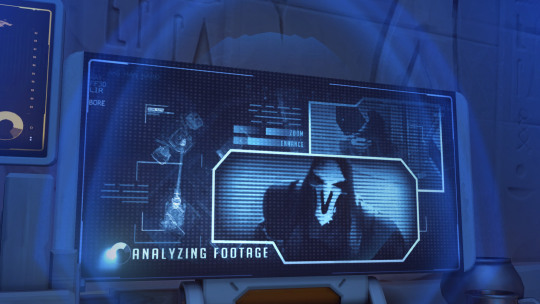
Well, Reaper (okay, that one’s a little different, but still.)
Obviously, this is a simplistic summary of things: there’s a lot more going on with the Reaper, Soldier: 76, Sombra, and connected characters plotline (such as Moira, Doomfist, Talon, Retribution, etc), but basically...
We have been shown Sombra knows who Soldier: 76 is, that she knows what his motivations and interests are on a personal level (Reaper), that she knows how to “bargain” with him somehow (re: the Lynx-17 panel), and that she appears to have facilitated the “trap” between him, Reaper, and “The Shrike”.
This applies to McCree almost to a tee -
Down to literally helping him “set up” a situation where he can recruit an ally.

As I wrote in “Reunion: Quick Bites” and “Echo Notes”, even though the short only has two main chunks of dialogue, there’s so much going on in the details that it’s actually a pretty sizable burst of expanding McCree’s plot and his character.
Taking it step by step:
1. Echo: the crate and key.
Again, just repeating what I said in “Echo Notes”, Echo’s crate is currently being transported by some sort of military train (which is also hauling more munitions and weapons). It appears to be moving roughly east to west (we’ll get into that again later).
A train this fully-armed would never have a public timetable or schedule - if it’s even on one. It may very well be an infrequent, single-trip transport. That means finding this information requires digging deep.
Or, you know.
Hacking some sort of confidential military system.
Don’t get me wrong - McCree is smart, and I have no doubt he set up the whole situation in “Reunion.”
But he’s consider a vigilante and is wanted by the United States law enforcement.
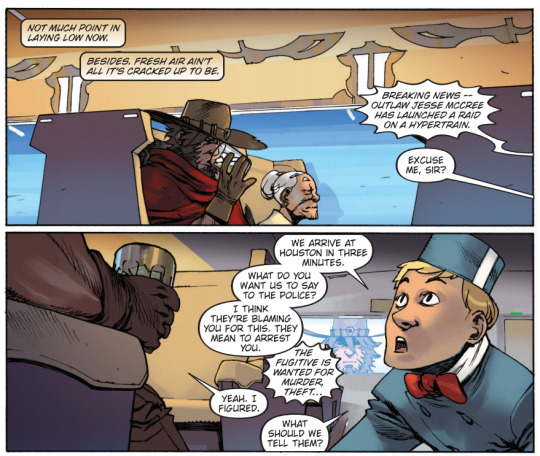
Gonna be a little hard for him to just walk into a military base and do the intel-digging by himself.

Good thing that’s something someone else is very, very effective at doing.
Like Soldier: 76′s story, Sombra fills in the first big “plot hole” in “Reunion”. In fact, it’s almost unfair to even call it a plot hole, because it really isn’t one: Overwatch has been slowly building the implication and connections in Sombra’s network for two years now (since her release).
The team doesn’t want to tell you that she’s helping McCree: for starters, that’s the worst way to do a story (“show, not tell”).
Secondly, the lead writer himself wants you to figure this stuff out:
“One of the things we really like doing with Overwatch is playing with perspective. We utilize perspective when we analyze or when we tell stories about characters, what they’re thinking, what their goals are. And we have a lot of unreliable narrators. We want people to pay careful attention to what characters think about in particular situations. We want them to use their judgment and their knowledge of a character’s thoughts to come up with their own ideas about the universe.” (Bold for emphasis)
- Michael Chu, GDC Spring 2017
The stuff about McCree has been in Sombra’s room in Castillo since the map was released in May 2017.
The animated shorts take several months - likely up to a year - to make in advance, but even then, this means the Castillo map and all its easter eggs and lore details existed well before Story and Franchise started storyboarding “Reunion”. I would argue that “Reunion” was actually specifically written to help build these links between Sombra and McCree, again, with just enough specific “gaps” in the story and just enough tantalizing wording by McCree to “show, not tell” those connections.
If Echo’s crate is being held by a military branch, institution, or a security force contractor like Helix Securities, it’s likely that her key was also being held by that same group, but in a different location.

This is obvious from the fact that McCree already has her key at the beginning of the short.
It has to have been in a different, separate location than Echo herself.
If what McCree implies about Echo is true (“they want me, but really, [Overwatch] needs you”) then Echo is being set up to be a strong character. Keep in mind that game balancing means she will never be, you know, unkillable - even Reaper dies in-game - but she’s certainly important to the former organization, and likely will be a powerful ally for the small, ragtag Recall team from a lore perspective.
This is a standard “spy thriller”/“secret treasure” trope in media: the “key” to unlock something Really Super Special is in a separate location. It’s especially common in video games, where a developer can quickly expand a quest by making the key a separate object to locate and retrieve first.
And if Echo is as powerful as McCree implies, then it makes sense that the organization “safeguarding” her physical body would remove the key and put it in a separate, secret location, especially if it’s another military base.
Because who’s going to be crazy enough to try and physically infiltrate a hostile, militarized base all on their own?
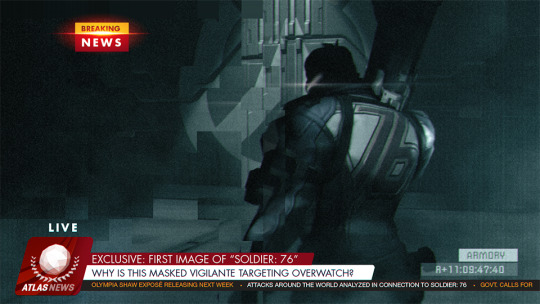
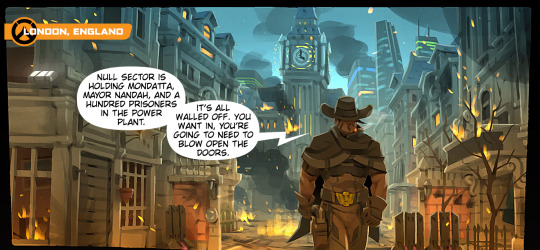
(It’s almost like there’s a pattern here.)
And this leads to:
2. “Well, Ashe...I’ve been kinda busy.”
So Sombra figures out the location of both Echo’s crate and her key. As I said in “Echo Notes”, we don’t exactly know where either of these are, just that the train is moving from east to west.
Given that we know now for sure that Deadlock Gorge is in Arizona, this means - in extremely broad terms - that Echo’s key was closer to Arizona (or even in the state) than her crate at or around the time of “Recall”.
Or at least -
That the key was closer to McCree than the crate was.
Granted, it’s possible McCree already had the key or was given it by someone else, but considering again that a non-Overwatch organization is in command of Echo’s crate, it seems unlikely that the U.N. or organizations like Helix Securities would just let an Overwatch agent hold onto the key after the formal disbandment of the group.
And it seems especially unlikely that they would let a former Blackwatch agent and currently-wanted “outlaw” like McCree to hold onto it.
I think it’s much more logical that Sombra found the information for both Echo’s crate and the key, and then passed this intel onto McCree.
After all -
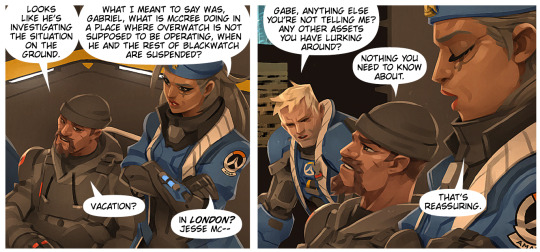
McCree is actually really, really good at sneaking into places and/or fighting his way back out.
And he specializes in heists.
Specifically heists of military-grade goods.
McCree had already made a name for himself as a member of the notorious Deadlock Gang, which trafficked in illicit weapons and military hardware throughout the American Southwest, when he and his associates were busted in an Overwatch sting operation.
- McCree’s Hero Profile
In fact, the covert ops mission that McCree is actually really, really bad at is:
Moira: McCree...we need to talk about your...Italian accent.
McCree: Well, I watched a bunch of old Spaghetti Westerns. I thought it was pretty good! Bone-a serr-a, signora. Can I-a get chu-a somethin’ ta drink?
Moira: Please, never do that again.
---
Reyes: This mess was all worth it to see McCree try and pass himself off as a waiter!
McCree: I thought I did just fine.
Reyes: ...You got fired from your cover job, Jesse.
McCree: The lady was being rude! She had it coming.
---
Going undercover.
(We’ll come back to this.)
Basically, I think it’s a lot easier - and actually pretty decently established in McCree’s character and lore - to reason that Sombra got the intel about Echo, handed it off to McCree, and let McCree do what he does best:
Steal stuff.
But then something interesting happens.

Recall occurs.
It’s possible McCree gets the key after Recall, of course. The timing of him actually getting the itself isn’t super important - just the fact that he already has it at the start of “Reunion” really implies a lot. But because most of the Recall-related shorts happen within a few days to a few weeks of “Recall” itself, it seems pretty likely that everything is kicking off all at once.
(In fact, I’m of the mindset that Reaper intentionally botched the “steal the Overwatch agent database” mission in order to push Winston into making the decision - the little clip at the end is very vague but seems to imply that Reaper is actually quite pleased with Winston’s decision. The entire mission is pretty pathetic in its design, and Reaper has several opportunities to kill Winston but never does. Yes, I am aware that Winston has plot armor, but it’s real weird that Talon’s using tasers when electricity puts Winston in super charged mode. But this is tangential, tbh.)
Again, while never stated, it is implied that several things begin moving and happening all at once, either directly because of Recall (e.g. Genji’s confrontation with Hanzo in “Dragons,” Mei’s awakening in “Rise and Shine,” Reinhardt’s decision in “Honor and Glory,” and now McCree’s shootout in “Reunion”) or as an overall consequence of Recall.
One of these is:

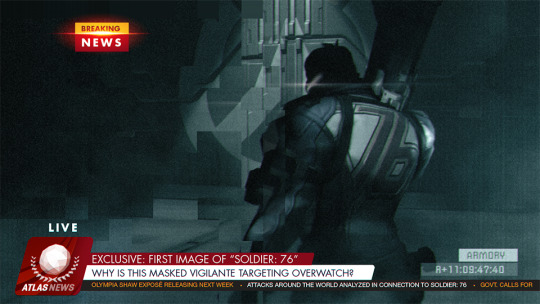
Soldier: 76 beginning a series of attacks and thefts from “multiple former Overwatch bases”.
So this is something that a few followers pointed out (and yes, something I had been considering for awhile):
Are Soldier: 76′s movements and attacks on former Overwatch bases being coordinated by Sombra, possibly in tandem with McCree’s work in the Southwest?
The answer is, possibly disappointingly, “I can’t say for sure either way.”
But it is interesting.
We already know that Sombra has some sort of connection to Soldier: 76. When exactly that connection is established is tricky to place: it could come after “Hero”, when she’s potentially able to strike a deal with him to get him to leave Dorado (e.g. “Ana Amari is alive. Want to know where she is? Get out of my city and I’ll send you the info.”). It could also come before that: we know Jack Morrison is pretty restless in the time between the fall of Overwatch and Recall (a span of 6 years), so they could easily have made contact with each other during that period.
There’s also the very tantalizing - if a little bit shoehorned in - possibility that Olivia “Sombra” Colomar is a Blackwatch agent.
There’s a single line in the second page of the Blackwatch Venice Mission dossier which states:
“Agent [REDACTED] also secured a position [REDACTED].”

There is the possibility that this line reads something like “Agent [McCree] also secured a position [as a waiter at Antonio’s restaurant]” or something...
But I don’t think it is.
For starters, McCree’s name is actually declassified in the memo:

In fact, the four main agents in the mission are completely declassified, so while it’s definitely possible that one of their names is in the Redacted spot, it seems unlikely.
It’s also possible that there is a future Blackwatch character we haven’t actually seen or met yet in the story. I’m not counting that out yet.
But I think a lot of people miss a few critical details about Sombra:

Sombra’s teddy bear Arturito has an Overwatch logo on it.
And though she absolutely was associated with Los Muertos:

Her relationship with the gang is more ambiguous and ambivalent than her Hero Profile implies.
And this is something I’ve said with stuff like Moira, and which is now pretty clearly demonstrated by things like Wrecking Ball and Ashe:
Team 4 deliberately leaves large gaps in character stories so that they can potentially fill those gaps with other connections or characters in the future.
People were shocked when they revealed that Genji was explicitly a Blackwatch agent and not just an Overwatch agent, but prior to that moment, nothing in Genji’s Hero Profile or his known backstory explicitly said that he was not a Blackwatch agent.
Similarly, in all the teasers, messages, and lore details that we knew about “Hammond”, nothing ever stated he was an ape or a monkey.
With Moira, her Hero Profile actually implied she was a Talon agent before she ever joined Blackwatch.

“...The shadowy Talon organization had already been supporting her for years, aiding her experiments in exchange for utilizing the results for their own purposes.”
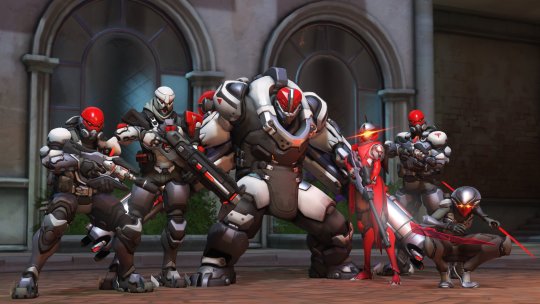
(And frankly, I take a good deal of pride in having read the clues correctly for this well before the mode was playable: [Tweet 1] [Tweet 2])
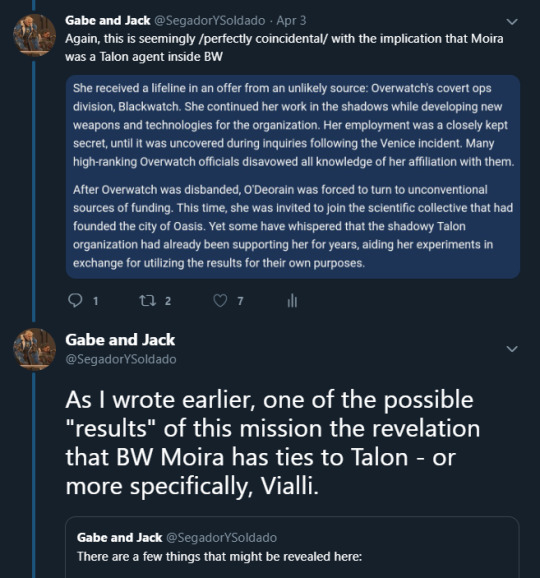
And now Ashe.
Personally, I think Ashe is complicated because it’s pretty clear she wasn’t actually intended to be anything more than a single-short character (which has been stated several times by Story and Franchise and Team 4 alike), so while she was never originally part of McCree’s backstory, there was enough room in his story for her to be placed in.
Point is:
We go through this song and dance every time a new hero or plot twist is revealed. Sometimes - like with Moira or Wrecking Ball - the implication is already there, or the absence of evidence does imply something more. Sometimes - like with Genji and Ashe - there’s enough of a gap in a character’s history and backstory that something can be developed in a way the fans weren’t expecting.
So here’s the thing about the idea of “Blackwatch Colomar”:
Is there space in Sombra’s backstory for this “plot twist” to exist? Yes.
Will Team 4 actually do it? Only they know.
But as this entire post has shown:
Sombra has numerous connections to numerous characters - many of them Talon-aligned, yes, but several of them are former Overwatch or Blackwatch agents. Hell, she’s even connected to Zarya at this point, and Zarya is effectively a non-aligned character at the moment. She is implied to be the only character Reaper trust remotely genuinely in Talon, implied to be giving information to Soldier: 76, and is now implied to be working outright with McCree.
People seem to think that unreliable narrators can only work if they’re forcing a limited perspective on a situation or concealing “bad” truths from the audience.
But that isn’t necessarily true.
An unreliable narrator can conceal good intentions just as much as they conceal bad ones.
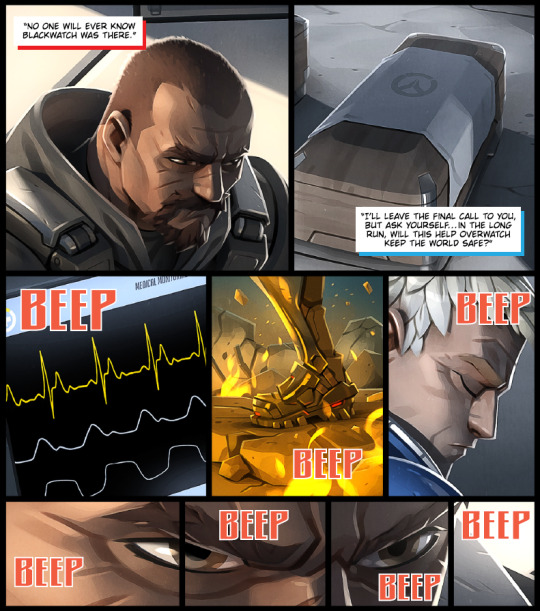
McCree: Is this what we’ve become, Gabriel? Gabriel: Blackwatch has always had one purpose: to do the real work of keeping the world safe. I thought you had the stomach for it. Looks like I was wrong.
And, as storytellers, the Overwatch development team is not beholden to tell you the truth - good or bad - either. They’re creating a story: they would much rather show you Sombra’s intentions - or Reaper’s, or Soldier: 76′s, or McCree’s - than tell you outright.
They’re not going to tell you that Sombra has a soft spot for Overwatch.

They would rather show you.
And to loop this all the way back around:

They’re not going to tell you how McCree got the information about the key -
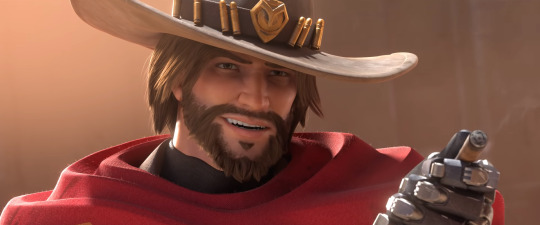
And they’re not going to tell you how McCree knew the crate was on the train because -
"All I want is that crate.”
The dialogue shows more about his character and the situation than literally stating it.
So before we move on, just to summarize:
How did McCree get Echo’s key?
Well, Sombra probably told him after hacking some Helix or military system for it. McCree’s covert ops specialty is conducting heists and thefts, particularly in military bases, cargo, and supplies.
Where was the key located?
In the Southwest United States, or maybe somewhere on the West Coast. Just in the west, I guess.
Why was Echo’s case being transported?
Probably because whatever organization was “safeguarding” it started getting nervous about Soldier: 76 locating her first. Or because Recall was initiated. Either way, the organization runs the risk of her getting found and effectively rescued by either Soldier: 76 or Recalled Overwatch.
Why would Sombra help McCree and/or Soldier: 76?
Because it’s entirely possible for a character to be both ambitious, chaotic neutral, and renegade in nature while also being nostalgic, sentimental, or entertained by “the good guys.” It is canon to Sombra’s character that she actually does her hardest to motivate others to change themselves, to see the truth, or to find empowerment through information.
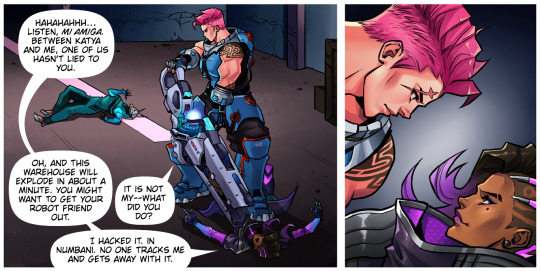
“Which brings me…to ‘Perspective.’ One of the things we really like doing with Overwatch is playing with perspective. We utilize perspective when we analyze or when we tell stories about characters, what they’re thinking, what their goals are. And we have a lot of unreliable narrators. We want people to pay careful attention to what characters think about in particular situations. We want them to use their judgment and their knowledge of a character’s thoughts to come up with their own ideas about the universe. You know, I’m asked often - with characters like Sombra or Soldier: 76, you know, ‘Are they anti-heroes? Are they villains?’ And I think, you know, you look at someone like Sombra, and it’s all about looking at, ‘What does she want? What is she willing to do to get it?’
“And you have to remember that when she’s telling you something, she’s serving her own ends too. So you know, you have to kinda make the decision for yourself. And I think you can take a character like Soldier: 76 - like obviously, he has this mission that he is on that he believes is good, he seems to be sometimes willing to do things which are… maybe not super heroic, and so it makes him complicated. We always have a lot of fun, uh - every once and awhile we’ll try and plot all the characters on like the traditional D’n’D alignment scale, and I think, you know, it’s fun exercise, but at the end of the day, I think what’s interesting about characters is that those alignments change depending on what situation you put them in, what’s important to them, and what decisions they have to make.”
- Michael Chu, GDC Spring 2017
Sombra can be and is the same character who has the ability to tease Reaper with a nickname only his “partner” has been allowed to call him, both as a reminder of what she knows about him and a callback to his internal motivations (protecting Jack).
In this regard, this aligns Sombra with characters like McCree, Soldier; 76, and Ana in methods and ideologies more than people realize. In the Recall-Masquerade-Searching era, none of these characters have any qualms about “breaking the rules” at this point, and yet all of them still find their motivations to be unified by a few things:
A sense of personal, often ambiguous justice.
A belief in protecting the innocent - but also punishing those who commit crimes.
The adaptability to work well “in the shadows”.
And mixed emotions on the newly recalled Overwatch.
And all this harkens back to:
Gabriel: Blackwatch has always had one purpose: to do the real work of keeping the world safe.
3. “You’ve never been one to shy away from a good tip.”
Let’s say that Soldier: 76′s actions - regardless of if they’re being coordinated with McCree’s via Sombra or not - do actually drive Helix Securities or whatever organization is holding Echo to desperation. They fill up a train with military weapons and her crate, hoping to transport it east to west to the other side of the country.
Perhaps they’re concerned that Echo’s key has gone missing, but they’re significantly more worried about the dude with an autoaim visor who just got the upgraded version of his favorite gun back.

This plays into McCree and Sombra’s hands pretty ideally -
Because what’s McCree really, really good at?
Heists.
And why is he good at heists?
Because even when he’s working alone, he still knows how to orchestrate them.
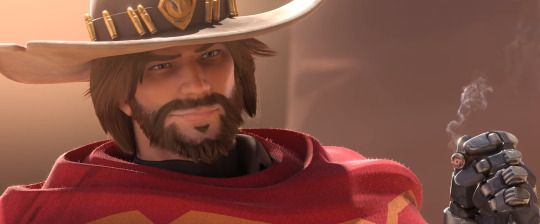
Because even though it’s been decades since they’ve actually last met -
McCree can still read Ashe like a god damn textbook.
Big train full of big guns, big bombs, big weapons?

That’s the kind of “merchandise” Ashe just can’t resist.

Work smarter, not harder.
The dialogue between McCree and Ashe implies that he was the one who “tipped off” the Deadlock Gang about the train:
McCree: Well, Ashe…I’ve been kinda busy.
Ashe: We’re pretty busy ourselves, so it’s awful convenient you showin’ up today.
McCree: …Yeah, you’ve never been one to shy away from a good tip.
Ashe: Hey! We worked hard for this score! You best move on now.
---
And even though it’s been decades, McCree still manages to get under Ashe’s skin right away. She doesn’t realize what McCree was actually implying (that he was the one who tipped off the gang), but instead bristles at what she thinks is the slight in his comment (that they get “easy tips” and therefore do “easy work”).
However, the whole conversation is meant to show you that McCree deftly set up the gang to basically do the whole heist for him. He rolls in after his phone call to the diner (which is actually operated by the Deadlock Gang), and thinks he has a enough time for a slice of pie and a cup of coffee.
He’s just a little bit off, though, because he only has time for two bites and one sip.
(But to McCree’s credit, maybe that’s all he wanted. He thinks the coffee at the diner “tastes like boiled dirt” anyways.)
So just a short one:
Who tipped off the Deadlock Gang?
Probably McCree, because he needed a way to get Echo’s crate off the train and he’s not really interested in repeating “Train Hopper”. Also because it looks like the military train was automated and running on a fast schedule.
4. “I’ve got some business to attend to.”
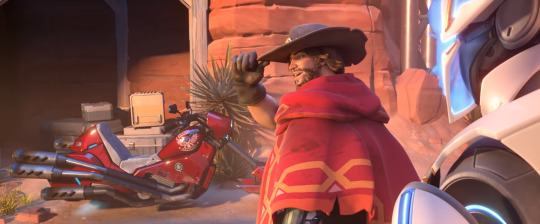
McCree: Well, that’s a story for another time, but I got a call. They want me, but really, they need you.
(McCree starts to walk away.)
Echo: Jesse, wait! What are you going to do?
McCree: I’ve got some business to attend to.
(McCree takes Ashe’s bike.)
McCree: Say hi to the monkey for me.
Echo: Monkey?
McCree, laughing: Scientist. Whatever.
---
At the end of the short, we get one last hint about what McCree’s been up to, where he’s been, where he’s going, and - more importantly - who he’s been around.
Again, just like Soldier: 76′s story, the timeline of McCree’s story skips ahead from the end of “Reunion” to this particular scene:
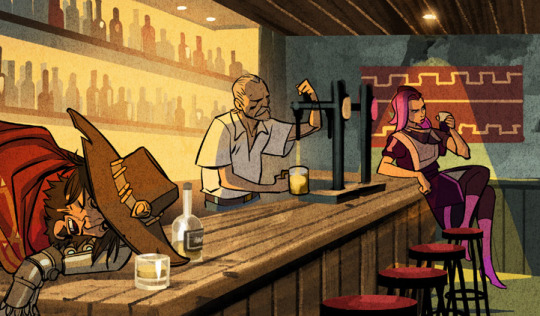
This is just like Soldier: 76 in that Soldier is literally shown in Dorado -

And then this is his next actual appearance in the plot.
The only thing that appears to have occurred in between “Hero” and “Old Soldiers”?
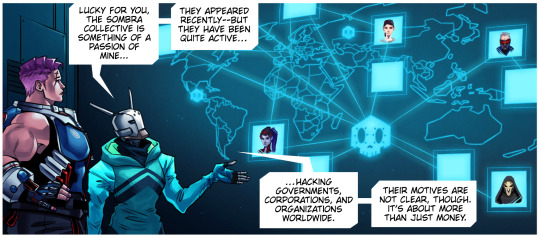
It’s hinted at in “Searching”, Sombra’s room in Castillo, and the Reaper sightings image in Necropolis.
Either Sombra is already connected to Soldier: 76 before “Hero”, or - like Zarya - she makes some sort of deal with him to get him out of Dorado and put him on the path to find The Shrike.
We can only guess at what McCree does in the few month span between “Reunion” and “Reflections”: perhaps he messes with Deadlock and Los Muertos some more. Perhaps he tracks their trade routes and arms-purchasing partners. Perhaps he keeps an eye on Helix-run facilities in the U.S. Perhaps he collects a few bounties. We don’t know for sure, but again, he leaves “Reunion” on Ashe’s bike and appears several months later in Dorado.

Again, the story isn’t going to tell you why he’s there or what he’s doing, especially if the Masquerade subplot is steadily being built up, but at this point, the evidence is pretty strong.
All in all, when we phrase it as a series of questions and look at the details provided throughout the game, comics, and shorts, we get a few straightfoward answers:
How did McCree get Echo’s key?
Sombra probably found the information and passed it off to him. McCree did what he does best and snuck into some sort of base and stole it.
How did McCree know Echo’s crate was being moved?
Again, the simple answer is that Sombra found the information. The group keeping Echo may have been worried about Soldier: 76′s actions or Recalled OW making moved to get her back, so they shipped her crate off with a bunch of other weapons.
What has McCree been “busy” with?
And
What is the “business” McCree has to “attend to”?
This one goes all the way back to “Retribution.”
McCree: This is all your fault, Reyes!
Reyes: I’m never gonna hear the end of this, am I?
McCree: I’m sure I’ll get over it…eventually.
Reyes: Good. Because I’m gonna need you, Jesse.
---
The straightforward answer is that McCree is still working as an underground Blackwatch agent.
As a reminder, another core component of the “Masquerade theory” is that Moira was the traitor who sold out the Venice Mission to Antonio, his forces, and probably the whole of Talon.

A key part of understanding Retribution is the realization that only four people knew the mission was occurring in the way that it was happening. These people were: Gabriel Reyes, Jesse McCree, Genji Shimada, and Moira O’Deorain. Jack Morrison and Fio the Blackwatch pilot knew the mission “was happening” but they did not have the details about it, and therefore are unlikely to have been the ones to have compromised it.
In fact, there are several interactions in Retribution that pretty blatantly imply this:
McCree: Aww, even though we snuck that surveillance system into Antonio’s office, our intel’s a little spotty. Genji: Next time, you should leave it to me. I can spy upon our enemies - unseen…and undetected.
A surveillance system was secreted into Antonio’s office and yet the Blackwatch team still missed key intel - because it is implied that someone on the team warned Antonio that his office was bugged.
Through the interactions with McCree and Genji, the player is meant to learn that both these characters are genuine and did not betray Talon. McCree is 100% furious about how the mission goes sideways, and Genji shows time and again that he hates criminals to a very personal and actually pretty harmful level (the implication being that a lot of his lingering resentments over his own family and brother are still present on his mind and emotional state).
That leaves Gabriel Reyes and Moira O’Deorain.
The game wants you to believe that Reyes somehow betrayed Blackwatch and Overwatch, but again -
What it shows you is actually very different:
Moira: Pity we’ll miss the masquerade - I have the perfect costume. Reyes: Didn’t think that would be your scene. Moira: There’s a lot of things you don’t know about me…
(source)
Moira: You did what needed to be done, Gabriel. Don’t apologize. Gabriel: I never have, and I don’t intend to start now. Someone has to be the one to get things done.
McCree: Better to kill them now than wait for another surprise attack! Moira, to herself: …ha, ironic.
McCree: …You seem awfully calm. Moira: I take it all in my stride.
---
The game wants you to play the detective and figure out the actual story being broken up and semi-concealed by four different, limited-perspective, unreliable narrators.
In fact, this is exactly why McCree becomes the lead narrator of the event, even though Reyes himself was the narrator in the comic.
This narrative shift has been used multiple times in Overwatch story events. The other obvious one is Uprising, where the comic is from Morrison’s perspective but the event shifts to Tracer narrating the intro and outro. However, you can see similar shifts in narratives in comics like “Old Soldiers” (starts with Soldier: 76, switches to Ana mid-way through), “Reflections” (starts with Tracer with interjections by Winston), and “Binary” (starts with Bastion, switches to Torbjörn).
And there are also many, many instances where a secondary POV character is implied but not explicitly told.
The list includes:
“Legacy”: main POV - Ana; implied POV - Widowmaker
“Masquerade”: main POV - Doomfist; implied POV - Reaper
“Searching”: main POV - Zarya; implied POV - Sombra
“Retribution” (the game mode) itself is effectively one of these, but with two implied POVs: McCree has become the main POV, but Reyes and Moira are the secondary, implied POV, and it is up to the player to sort through the mess of interactions and heightened emotions to realize the truth.
However, even if you don’t unlock the best interactions that show this, the ending by itself literally does:


It’s also pretty easy to figure out that - well - despite his anger, McCree doesn’t actually leave Blackwatch after the mission.
In fact, something Reyes says in his debriefing - to Morrison, Amari, Lacroix, and McCree (through the window) - convinces all of them that: 1) Reyes himself can still be trusted, 2) McCree and Genji can still be trusted, and 3) something much bigger than Antonio is threatening to undermine them.
Again, the game doesn’t tell you this, but it does show you what it is, 8 years later:
Moira: Our courageous cowboy… The years haven’t changed you much, have they, Jesse? McCree: Well, they certainly haven’t changed my feelings about working with you.
---
McCree: Always thought hiring you was a mistake. Moira: The best mistake one could ever make.
---
Soldier: 76: You were a disgrace to Overwatch. If I had known what Reyes had been planning, I would never have allowed it. Moira: It seems to me that it was convenient for you not to look too closely into Gabriel’s business… (Audio link)
---
McCree and Soldier: 76 believe that Moira betrayed Blackwatch.
Soldier: 76′s statement is clear, McCree’s is more vague but still gets to the point. Interestingly, neither Soldier nor McCree ever state directly that they think Gabriel Reyes betrayed Overwatch and/or Blackwatch. Soldier: 76 alludes to “what Reyes had been planning”, but he never says what that “plan” actually was, and if you’ve followed this blog long enough, you know that I believe Soldier is referencing Reyes’/Reaper’s plan is his reverse-infiltration of Talon.
But here’s the other thing about McCree and Soldier: 76′s awareness of Reaper’s goals:
It doesn’t actually imply their respective approvals of this method.
And we come back to the “issue” with Sombra again:
Connected characters don’t actually have to 100% like or approve of another character’s ideas, methods, plans, and strategies to cooperate with them.
It does not mean Sombra is or isn’t blackmailing them (or Reaper or Ana). It does not mean that they do or do not like Sombra or Reaper’s methods.
It is entirely possible for characters to have the same “good” intentions and the same aligned objectives without actually liking each other’s methods and tactics.
Like I said above, I personally think all these characters do actually get along, even if they occasionally frustrate or irritate each other (or disagree over methods). Taking “Retribution” and “Uprising” as windows into the different characters’ personalities and interactions before the fall, we see many examples where characters who are still allies or friends after the fall disagree or banter around with each other. Canon character who will eventually cooperate with each other in Recalled OW are Tracer, Reinhardt, Torbjörn, and Genji, and again, if this Masquerade theory is correct, then Reaper, Soldier: 76, Ana, and McCree are also still working together.
That said:
There’s a lot to imply that what Reaper and Soldier: 76 are doing in the present-day is simply a more extreme version of the roles they have always played with each other:
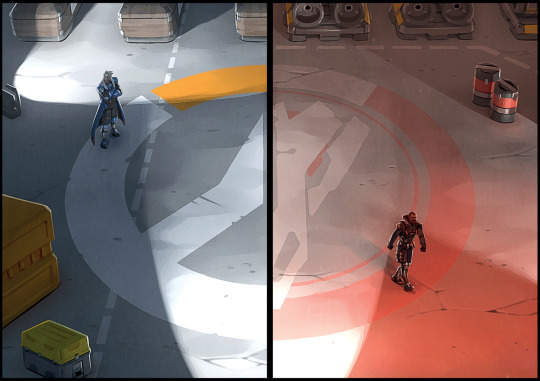
They’ve both gone “rogue”, yes, but one of them (Reaper) is playing “the bad guy” in order to convince Talon he’s 110%, totally serious about being part of their organization, while the other (Soldier: 76) is playing “the fallen hero” in order to convince characters like The Shrike (Ana) to join their plans.
I can’t really stress how much McCree’s actions in “Reunion” effectively parallel Soldier’s in “Old Soldiers”.
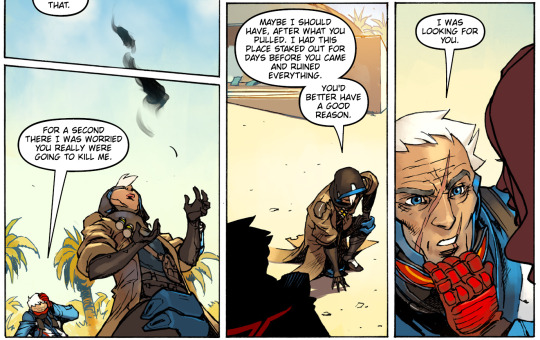

Everything from getting intel from Sombra, “setting up” a trap with a “rival” (personally, I think Ashe was 100% unwitting about McCree’s intentions, whereas Reaper’s actions and words in “Old Soldiers” are so blatantly out of place that it’s pretty easy for the informed reader to realize they’re fake at this point), down to the actual recruitment narrations.
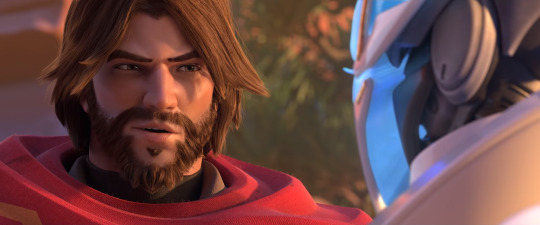
���But I got a call - we’re getting the band back together. They want me, but really? They need you.”

The twist though?
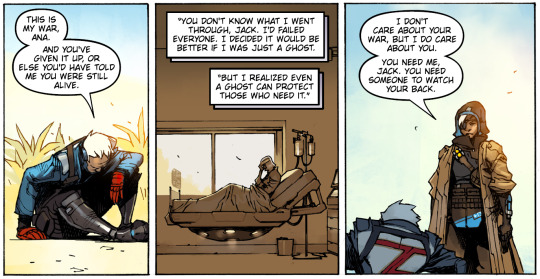
(“You need me, Jack. You need someone to watch your back.”) Ana is not Echo.
And she quite literally “flips the script” on Soldier, to the point where he even jokes about it.
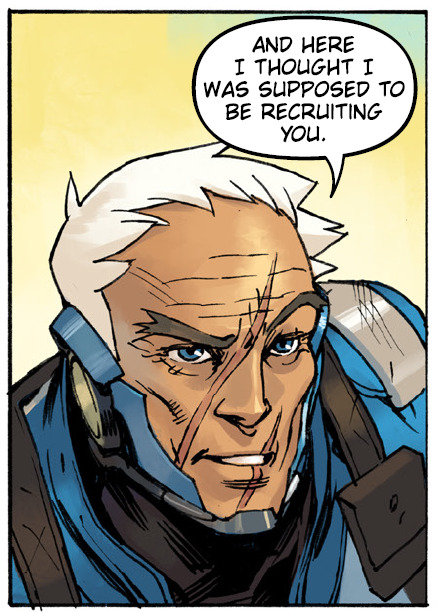
And like, even the last “conversation” in both the short and the comic parallel each other:
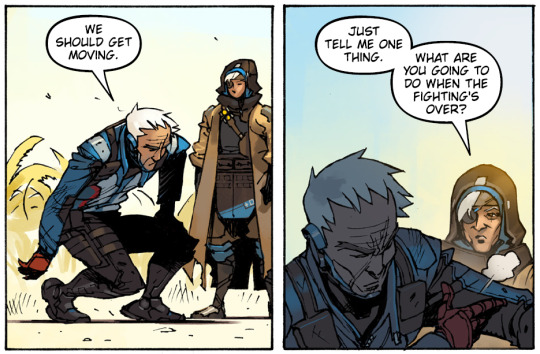
Ana: Just tell me one thing. What around you going to do when the fighting’s over?

Echo: Jesse, wait! What are you going to do?
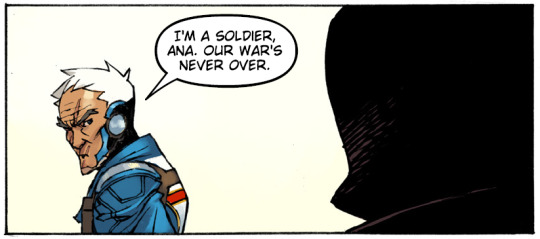
Soldier: 76: I’m a soldier, Ana. Our war’s never over.

McCree: I’ve got some business to attend to.
I’d say that Sombra’s network of characters currently works like this:
“In the shadows” half: This half is composed mainly of Reaper and Sombra. This group is reverse-infiltrating Talon. Sombra runs the distraction element in order to get the other Talon member to trust Reaper more. Meanwhile, Reaper passes on information to Sombra that she either can’t access or isn’t “digital” (e.g. the identities of the Talon leaders). Because Reaper is deep undercover, he can’t be caught being “friendly” with Soldier: 76, Ana, McCree, Winston, and/or Tracer, but because Sombra is effectively passing (or stealing) information from Soldier: 76, Ana, McCree, and Recalled OW, Reaper is still able to coordinate missions with them. Many times, Reaper does something that “accidentally” causes these missions to fail (e.g. bringing tasers, not killing Winston, stepping on Winston’s glasses, etc). This group is an extreme version of Blackwatch.
Characters with a decent likelihood of joining this group in the future include: Widowmaker (if she can break her brainwashing), Moira (depending on if she picks Reaper over Doomfist), possibly Sanjay and/or Symmetra.
“Rogue vigilantes” half: This half is composed mainly of McCree, Soldier: 76, and Ana. This group has ambivalent feelings about both the plans for reverse-infiltration and recalling Overwatch. They’re not really for or outright against either plan. These characters have their own sense of justice and either do not agree with Reaper and Sombra’s methods or are not capable of enacting them. However, this group still has a massive pool of shared and individual skills that can still be effective in other situations, such as heists and thefts, information collection, bounty hunting, and “fringe support” in case something goes wrong. This group is an extreme version of Overwatch.
Characters with a decent likelihood of joining this group in the future include: Zarya (who is “lost” after “Searching” and looking for a new purpose), Hanzo (who rebukes both Genji’s offers and Doomfist’s, but who is interested in Ana’s methodologies), Symmetra (who will likely defect from Vishkar in the future)
In fact, while it isn’t 100% canon, I don’t think it’s a surprise that one of the OWL finals sprays included this group:

The other three sprays include two “canon groups”: Winston, Mei, Tracer, and Emily, and Reinhardt, Brigitte, Torbjörn, and Bastion. So while the above group of Hanzo, Zarya, Sombra, and McCree isn’t confirmed canon, it is definitely an interesting clustering of characters.
And this brings me to the very last part:
5. “Scientist...Whatever.”
McCree: Say hi to the monkey for me.
Echo: Monkey?
McCree, laughing: Scientist. Whatever.
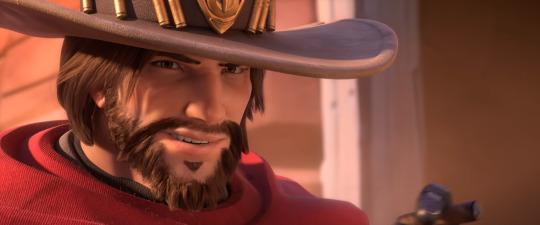
If the rest of the short didn’t implicate McCree’s connections to Sombra and Reaper, then this part sure as hell did.
There are only two other characters in the entire playable Overwatch cast who call Winston the incorrect and joke term “monkey”:
Athena: Winston! He’s going to have all agents’ locations!
Reaper: I’ll be sure to send them your regards, monkey.
Winston: I’m not a monkey!
Reaper: (laughs)
Winston: I’m a scientist!

Reaper.
And:
Sombra: Isn’t it a little embarrassing to get beaten up by a monkey? Doomfist: Have you ever been hit by a giant, genetically engineered gorilla? I could arrange it for you…

Sombra.
The inclusion of McCree calling Winston “the monkey” wasn’t just a cute joke: it’s a pretty blatant reference to Reaper’s dialogue with Winston in “Recall.”
Considering McCree isn’t supposed to be in contact with his old commander and is also supposed to be mad at him, this is a pretty telltale sign of what he’s actually doing.
I went back and looked over Michael Chu’s statement about Reaper and McCree’s interactions in the Recall-Searching era and perhaps unsurprisingly, he doesn’t actually state that they’re not in contact with each other.
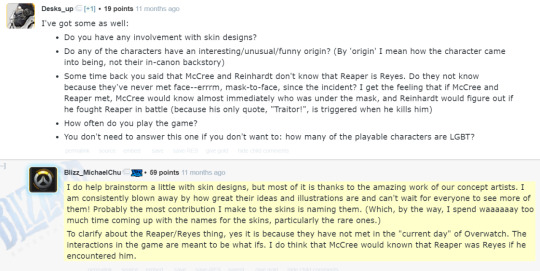
(source)
Question: “Some time back you said that McCree and Reinhardt don’t know that Reaper is Reyes. Do they not know because they’ve never met face–errm, mask-to-face, since the incident? I get the feeling that if McCree and Reaper met, McCree would know almost immediately who was under the mask, and Reinhardt would figure out if he fought Reaper in battle (because his only quote, “Traitor!”, is triggered when he kills him).”
Michael: “To clarify about the Reaper/Reyes thing, yes it is because they have not met in the “current day” of Overwatch. The interactions in the game are meant to be what ifs. I do think that McCree would know that Reaper was Reyes if he encountered him.”
What he says, quite literally, is that “they have not met in the ‘current day’ of Overwatch.”
And this is the exact type of vague wording that allows the team to do things like Blackwatch Genji, or Retribution Talon Moira, or hamster Hammond, or create Ashe.
Michael does not say “they haven’t met since the fall of Overwatch.” He does not say “they’re mad at each other.” He doesn’t say “they never communicate after the fall.”
This gives him a lot of room to change this situation as needed. McCree and Reaper could have met before Recall. They could have met up two, three, four years ago. They might not have met at all since the fall, and only communicate through Sombra, in which case, McCree picked up Reaper’s bad habit of calling Winston “monkey” through her.
They just literally haven’t met since Recall, through Reunion, through Reflections, through Masquerade, and probably through Searching, a time period which spans roughly one year to eighteen months (Recall occurs in Spring 2076 to Masquerade in Feb-March 2077 to Searching which is after Orisa is built in 2077).
And the final possibility:
Michael Chu just straight up lied about it.
Because again, the team has no obligation to tell you the plot of their story.
People seem to think that the developers have to be honest with them, especially when answering direct questions about the character or the game. This isn’t true at all. In fact, literally only a month ago, Bill Warnecke blatantly stated that “This patch does contain some balance tweaks and bug fixes, but it isn’t large due to any secret data preloading.” when that exact patch actually contained Ashe for the PTR.
Michael Chu has every right to be cheeky and vague when answering plot questions, and he actually does that pretty frequently:
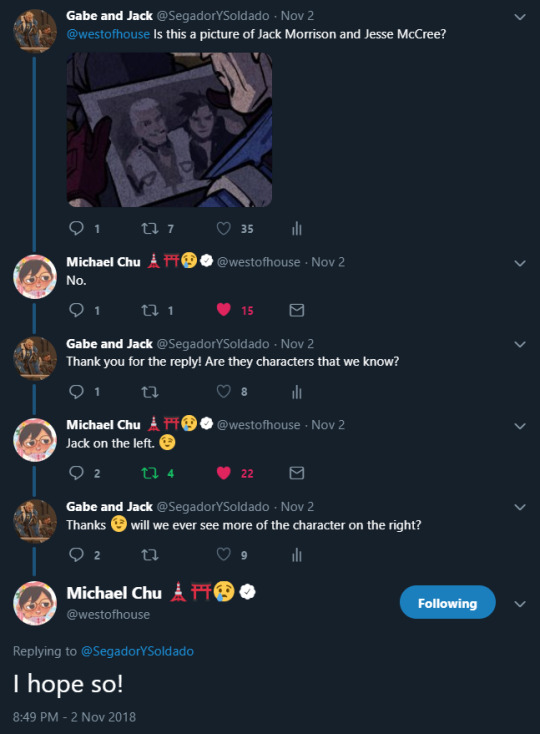
Just like a magician has every right not to spill their secrets, writers and development teams have every right to keep major plot points, characters, and gameplay changes secret until they’re ready to share them.
Granted, this in turn means that you have every right as a customer not to support them. You shouldn’t take inappropriate or poor taste answers as replacement for good customer service or good fan interactions. If you find answers or statements unsatisfactory, you have every right to stop supporting the game or its developer. I’m saying this specifically because there’s one Big Name Game and Developer currently generating a ton of talk about horrific customer service and complete disregard for fans. Activision-Blizzard itself is not free from criticisms, and several aspects of Overwatch are part of that larger discussion.
But over the last two years of playing this game and becoming deeply invested in the story and world it is building, I’ve come to realize that many fan expectations for the team and for Michael in particular are extremely unfair. You wouldn’t expect your favorite book author or show runners to spoil their own content, and you shouldn’t expect that from a video game writer either. As I said in the paragraph above, this is separate from criticisms about poor fan interactions or poor customer service, or even separate from discussions about game design and game writing. I think there are arguments to be made that the writing in Overwatch struggles in many spots, or is too vague, ambiguous, and ambitious in other spots (such as Retribution, which had several subplots which went directly over most of the fandom’s heads), but expecting the lead writer to just tell you if McCree, Sombra, and Reaper are still paling around or working together to bring down Talon and help Recalled OW is in poor taste on part of the fans.
Summary:
To bring it all together, here’s how McCree fits into the Masquerade theory:
Eight years ago, the Blackwatch Venice Mission goes wrong. Reyes discovers that his “new doctor” Moira O’Deorain has betrayed Blackwatch and is a double-agent for Talon. He convinces Morrison, Amari, Lacroix, and McCree that Blackwatch and Overwatch as a whole are at serious risk of being compromised and endangered. Morrison suspends the Blackwatch division but allows Reyes, McCree, and Genji Shimada to keep operating as agents.
Reyes - with or without the other characters’ approval - beings making plans to reverse-infiltrate Talon to enact retribution on them and bring them down. At some point, he makes contact with Olivia “Sombra” Colomar. She may or may not be a Blackwatch agent herself.
However, the Venice Mission has shown Reyes something else:
McCree: Is this what we’ve become, Gabriel? Gabriel: Blackwatch has always had one purpose: to do the real work of keeping the world safe. I thought you had the stomach for it. Looks like I was wrong.
McCree is not the agent capable of going deep undercover to protect Reyes’ back.
As I’ve written in “Long Reasons” and “Retribution and Reapercussions”, there are multiple instances in Retribution where McCree isn’t fully “in” on the delicate cat-and-mouse game Gabriel and Moira are playing. Gabriel is balancing a very difficult situation where he must keep Moira on his side because she is quite literally the only person who will keep McCree and Genji alive during this mess, whereas Moira doesn’t realize her cover has actually been blown and is still willing to go along with Gabriel and the team because she thinks she can still slip back into Overwatch without a hitch.
McCree, however, is sort of stuck in the unfortunate spot of being our “main protagonist” so he gets all the narrative clues without really figuring out what’s going on. In a classic spy thriller trope (or perhaps better as an ironic Holmes and Watson moment), McCree is the Watson or Lestrade to Reyes’ Holmes in this event (particularly funny given that McCree got a Sherlock Holmes skin for the Anniversary event immediately after).
What this does show, however, isn’t that McCree somehow isn’t smart or isn’t clever - “Reunion” very clearly shows he can be and is both. Instead, “Retribution” shows that McCree just isn’t very suited for the “real work” of going deep undercover and stringing smart, intelligent, ambitious, and uncompromising characters like Moira, Akande, Maximilien, and Sanjay along.
McCree “plays the fool” well in Retribution because he doesn’t fully get it in the moment.
Sombra, on the other hand, is much better suited for this role: she “plays the fool” well enough to distract other Talon members and draw their attention while letting Reaper “reap the rewards” and make the organization rely on him more and more. They need him to keep an eye on her, they need him to be an unkillable commander, and they need him to help shore up the slacking and ineffective Talon leadership.
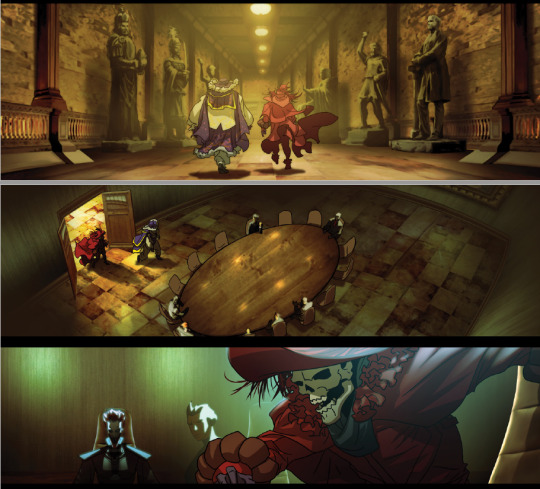
And it works.
Reaper gets a spot in the council.
Sombra gets more critical intel about Talon’s structure and its connections to other organizations - such as Sanjay and Vishkar, which she can use to potentially turn characters like Symmetra away from Vishkar’s control.
Again, we don’t know exactly when this cooperation between Reaper and Sombra began, but it’s plausible it started just before the fall of Overwatch or shortly after.
Reyes needs someone to cover his back because as he goes deeper and deeper into Talon’s clutches -
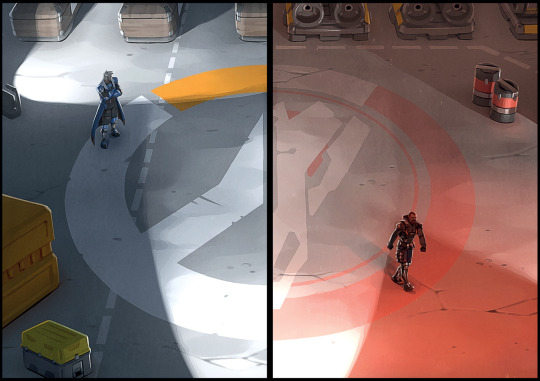
His “partner” Jack Morrison cannot follow him.
(Not that Reyes wants to jeopardize Morrison, to be honest. Protecting Jack is Gabriel’s whole motivation to begin with.)
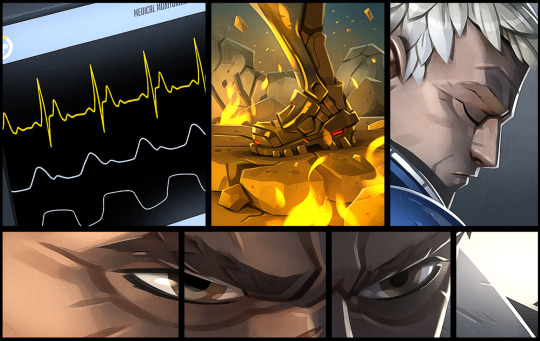
And one of his most trusted agents is absolutely terrible at going undercover:
Moira: McCree...we need to talk about your...Italian accent.
McCree: Well, I watched a bunch of old Spaghetti Westerns. I thought it was pretty good! Bone-a serr-a, signora. Can I-a get chu-a somethin’ ta drink?
Moira: Please, never do that again.
---
Reyes: This mess was all worth it to see McCree try and pass himself off as a waiter!
McCree: I thought I did just fine.
Reyes: ...You got fired from your cover job, Jesse.
McCree: The lady was being rude! She had it coming.
---
Instead, between “Retribution” and “Uprising”, Reyes starts putting McCree back on the types of covert ops missions he’s good at: sneaking into militarized hot zones, conducting basic reconnaissance, and setting up heists and thefts.
By “Uprising”, this appears to suit both the commander and the agent just fine.
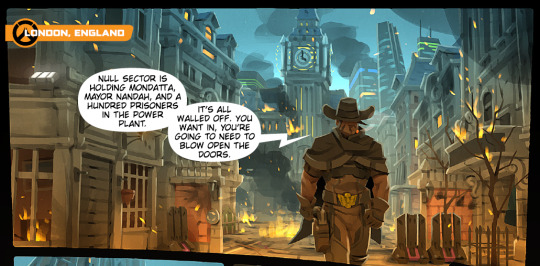
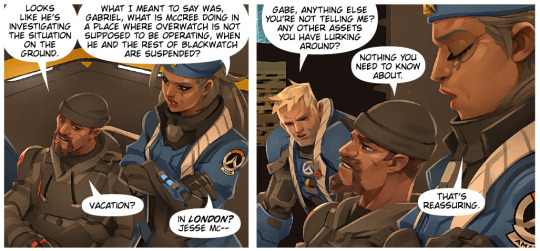
But in the timespan between “Uprising” and the fall of Overwatch (approximately 1 year), things take a dramatic turn for the worse.
Reinhardt his forced to retire, a decision Torbjörn is furious with. We don’t know if Jack was forced by his own superiors to make the decision, or if he made the choice to potentially protect Reinhardt (either from double-agents or from harming himself in battle, tbh). However, this begins to isolate Gabriel and Jack from a support network that kept them secure from Talon.
And then at some point:
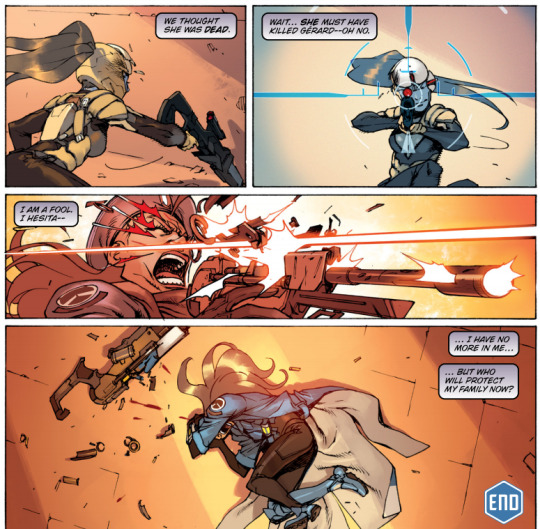
Ana loses a critical sniper battle against Widowmaker -
And Gabriel and Jack’s greatest ally is suddenly “dead” to the world.
Either shortly before or shortly after this, McCree leaves Overwatch.

It’s likely that McCree left for his own protection, otherwise he could’ve easily ended up “like Ana”.
...Or worse.

(It is strongly implied that Jack Morrison survived the Swiss Base explosion because he is genetically “enhanced”, something which McCree doesn’t have.)
Again, it isn’t surprising that McCree’s story effectively parallels both The Shrike’s (sharpshooter disappears and returns later as a bounty hunter) and Soldier: 76′s (commander and soldier loyal to BW/OW disappears and reappears later as a vigilante pursuing his own idea of justice). The three characters are unified by this trope and have connections to Sombra.
It also isn’t surprising that Sombra is essentially "a shadow” of the roles that Morrison and McCree had for Reyes prior to the fall: she is a reminder of all that Reyes stands to protect (Jack, the partner who called him “Gabe”) and the agent he considered “effective” and saw great potential in (Jesse, the agent he recruited). But in many ways, Sombra is far, far better suited to operate as Reaper’s partner-in-crime - the shadow to his smoke and mirrors - as he goes deeper and deeper in infiltrating Talon than either Soldier: 76 or McCree is.
Both Soldier: 76 and McCree are much better at blunter approaches to intel collecting and reconnaissance, and both are better at recruiting allies than Reaper’s “masquerading” persona. They appear to be operating on the fringes of both Talon and Recalled OW, searching for other methods that can work in tandem with Reaper and Sombra while not compromising either character’s cover.
And just to really hone it in:
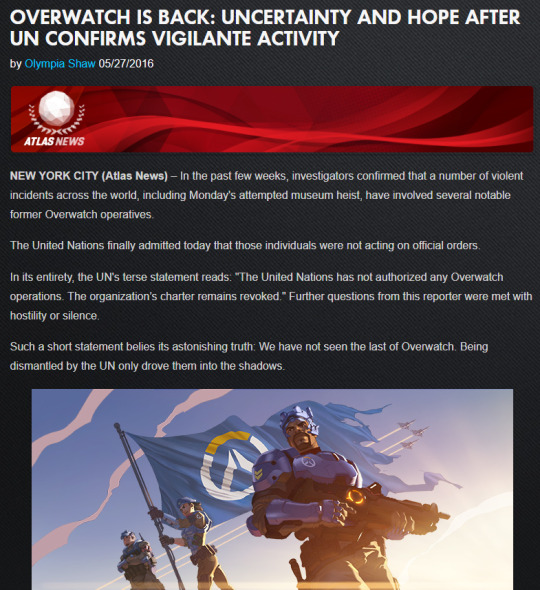
[Such a short statement belies its astonishing truth: We have not seen the last of Overwatch. Being dismantled by the UN only drove them into the shadows.]
We really should have expected this from the moment Overwatch launched.
I mean -
The developers told us to pay attention to the shadows.
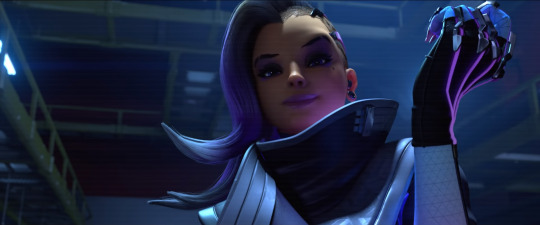
#long post#mccree#jesse mccree#sombra#olivia colomar#reaper#gabriel reyes#soldier: 76#jack morrison#masquerade theory#my essays#my writing#this took me like a month to even attempt#end me#reunion#retribution#uprising
358 notes
·
View notes
Photo

**Spoilers**
4/5
The second book in the Wires and Nerve spinoff graphic novel companion duology to The Lunar Chronicles Series is Vol 2: Gone Rogue. The Lunar mutant soldiers that Alpha Steele has recruited have set their sights on Cinder and her friends. If they cannot have restitution, then they will have vengeance. After the narrow miss with Thorne, Cress, and Iko, Steel and his pack pay a visit to Benoit Farms. Wolf returned to the farm with Scarlet shortly after the events of Winter. The two have been living together and running the farm, and Wolf is ready to take the next step. He has a ring, but he has hesitations about proposing to Scarlet and forever tying her to a “monster”. Before Wolf can voice his fears or pop the question, Steele arrives to ask Wolf to join his pack. To Scarlet’s bafflement, he agrees and leaves with them.
Cinder arrives in the Commonwealth where security has been maximizes and the military has been brought in. As much as their presence contradicts the peaceful nature of the celebration, the additional preventative measures are for the safety of Cinder as well as the people of the Commonwealth. This is Cinder’s first trip to Earth since the Lunar revolution, so she uses this opportunity to visit Peony’s grave for the first time. Cinder is dismayed by the separation she feels when she see’s the grave marker. She had hoped to feel some kind of connection to her younger sister at the grave site. Kai then gives Cinder a gift, Peony’s ID chip, which he had made into a necklace after it had been collected as evidence when Cinder was a fugitive.
While Cinder, Kai, Kinney, and Iko are taking some leisure time, Winter, Jacin, and Kinney’s sister Tressa are hard at work. Winter is giving an interview about Linh Garan’s device when Steel and his pack arrive at the studio. The pack takes Winter, Jacin, Tressa, and the interviewer hostage before broadcasting a message to Cinder. Steele plans to use Cinder’s friends as hostages to get the Lunar Queen to meet with him. Cinder being Cinder cannot say no to a chance to risk her life to help her friends. That is, until Iko comes up with a better plan. Cinder and Kinney meet with Steele, except Cinder is actually Iko in the body of a Cinder look-a-like escort droid. When Steele realizes that he has been duped he destroys the escort droid body as well as Iko’s personality chip.
Kinney takes Iko’s loss especially hard. Cress finds him in one of the rooms in the palace in New Beijing talking to Iko’s body when she tells him that she made a copy of Iko’s personality chip just in case. Though several weeks of Iko’s memory are missing, she is still ready to face Steele and his pack at the ball. Cinder, Iko, and the rest of their friends stage the ball with Androids and ultimately apprehend Steele and his pack. The soldiers will be tried individually to determine their fates once they have be deported back to Luna. The story ends with Scarlet and Wolf getting engaged, Thorne and Cress continuing to travel the world, Jacin attending Earthen medical schools with Winter’s support, Cinder and Kai continuing to improve Lunar-Earthen relations, and Iko and Kinney ready to answer the call should more rogue soldiers come out of hiding.
Gone Rogue served as a satisfying conclusion to the Wires and Nerve duology. While it was nice to catch up with the main characters from The Lunar Chronicles series, watching Iko kick ass while contemplating her humanity allowed for some complex character development for a character once seen as a glorified sidekick. The illustrations add to the story and the plot thankfully doesn’t suffer as a byproduct of the story’s format. While I tend to enjoy normal novels over graphic novels, the change in format from the other books and companion novels in the series went well with this specific story. Iko is jovial and unique, and presenting her story in a similar way served to reinforce these qualities.
My only real problem was with the character of Kinney. In Winter, Kinney assists Cinder and her friends, and becomes one of Cinder’s most trusted royal guards. There was tension between Iko and Kinney even then, but one could argue that it was because the two were unfamiliar with each other. In Wires and Nerve, Kinney continues to be extremely disrespectful to Iko. He blatantly shows his disdain for her, speaks down to her, and even compares her to Levana. Cinder seems to be very well aware of Kinney’s feelings towards Iko, and yet she doesn’t speak up. Cinder allows her best friend to be ridiculed and be the subject of prejudice, a situation that Cinder herself is familiar with. The Cinder from the primary series would not have allowed such open disrespect to take place, and it is disappointing to see it occur in this companion novel. Kinney ultimately warms up to Iko, but still.
Wires and Nerve Vol 2: Gone Rogue is a fun science fiction/ fantasy adventure with a kick ass female lead, following the trend of the other books in the series. While a happily ever after for everyone involved may seem a little cheesy, it works in this case. The characters, Iko most of all, are faced with hardships through the entirety of the two books, so it is nice to see them finally get a moment of happiness at the end. For anyone who hasn’t read the series yet (and hopefully skipped the summary above) I would suggest reading both Wires and Nerve books before reading Stars Above.
#ya#ya fantasy#ya fiction#ya lit#ya reads#ya books#ya sci fi#ya science fiction#young adult book#graphic novel#wires and nerve#lunar chronicles#the lunar chronicles#iko#book nerd#book nerdigans#bookish#booklr#book#book lover#book love#book life#book review#book recommendations#book recc#book reccs#booknerd#booknerdigans#booklover#booklife
1 note
·
View note
Quote
One of the most famous formulations of the forced choice was given by Lacan in his seminary on the Four Fundamental Concepts of Psychoanalysis (Lacan 1973, p. 193)As Althusser has illustrated the mechanism of interpellation recurring to the most trivial experience (such as responding to someone calling you on the street or being interpellated by the police), so Lacan also takes a very drastic example (though fortunately not so common as the Althusserian ones), that of being presented with a choice of: “Your money or your life” (“La bourse ou la vie”). The peculiar in this choice is that there is no choice at ~all: one can only choose to hold to one’s life and thus lose only the money; holding on to the money would entail losing both. One can only choose one alternative, the life, and even this one is curtailed (the life deprived of money), whereas the other alternative is void. In any case, one loses the intersection of both (the life with the money). The formal side of this model may serve as a pattern of subjectivation: one is presented with a choice which is decided in advance, and by choosing, one meets with a loss. To put it roughly, the subject, in its insertion in the social, is subject of a choice, but a forced one, and of a loss. This experience is very common, not confined to dark and solitary alleys. Love, in its many various 9 forms,11 has this mechanism of forced choice always attached to it. I have started with the simplest and the most general example, something that everybody has to undergo to become a social being. But love in its most emphatic and glorified form, true love, ‘sexual’ love, the traditionally celebrated love between a man and a woman’ (leaving aside the more recent awareness about the heterosexual bias), involves precisely the same device. It would seem that there has to be an autonomy of a free choice -indeed one cannot speak of love if there is no freedom of choice (if the choice is made, e. g., by parents as the common practice had it until quite recently). Yet to take a closer, or even a very superficial, look at the centuries of effusions about love, it is obvious that love and autonomy of the subject rule each other out. All melodramas know that; the pattern could be described as follows: A young hero quite by coincidence and through no endeavour of his meets a young girl in some more or less extraordinary circumstances. What happened unintentionally and by pure chance is in the second stage recognized as the realization of his innermost and immemorial wishes and desires. The contingent miraculously becomes the place of his deepest truth, the sign of Fate given by the Other. It is the Other that has chosen, not the young man himself who was powerless (and who has to face heroically, in the third stage, the consequences of his non-choice: the opposition of the parents or society, the intrigues, the bad fortune, the illness etc., with various possible combinations and outcomes). It turns out that the pure chance was actually no chance at all: the intrusion of the unforeseen turned into Necessity, the tyche tumed into the automaton. The moment of subjectivation is precisely that moment of suspension of subjectivity to the Other (Fate, Providence, Eternal plan, Destiny, or whatever one might call it), manifesting itself as the pure contingency of the Real. Indeed, that strange force of love reputedly rules out any other considerations, it does not permit deliberation, the balance of gains and losses, pondering the advantages of a certain choice – it just demands the unconditional surrender to the Other.12 The situation is contradictory since it presupposes the freedom of an autonomous choice and demands its suppression. This contradiction is reconciled in a strange logic of post festum: the young man has chosen only by recognizing that the choice has already been made, regardless of his freedom of choice; he could only endorse and corroborate the decision of the Other by accepting the unavoidable as his own inner essence. In other words, the choice is a retroactive category, it is always in the past tense, but a special kind of past that was never present. The~ moment of choice can never be pinpointed, it passes directly and immediately from a “not yet” to an “always already”. It is past by its very nature. Falling in love means submitting to the necessity – there is always the moment when the Real, so to speak, begins to speak, its opacity turns into transparence; the subject has only to recognize it after the fact. Lots of examples immediately spring to mind. One could imagine the alluring task of setting up a catalogue of that precise moment of falling in love, taking the world literature, plus the cinema, from its highest to its lowest forms, as the evidence in the matter. The task was actually remarkably accomplished, at least for the bulk of French literature, by Jean Rousset (1984) who has undertaken an extensive phenomenology of “the scene of the first sight in the novel” (as the subtitle of his book goes, the title being Their eyes met). 1 must leave the matter with the reference to his work which could be pursued further in many different directions and on other material.13 But perhaps the paramount case which offers the clue to the matter is the one discovered by psychoanalysis: the case of transference in the psychoanalytic cure. In 1915, Freud has written his famous “Observations on transference-love” (S. E. vol. XII), analyzing that extraordinary love which is a kind of by-product of the analysis that surprised Freud himself. It emerged as an artefact disturbing the smooth development of the analytical cure, and for quite a long time its implications were not seen. This love of the patient for the analyst (in the beginnings, psychoanalysis had mostly to do with hysterical female patients) springs up with an astonishing, almost mechanical regularity from the analytical situation, regardless of the person of the analyst and that of the patient. It is a love artificially produced, only a function of the analytical situation, its infallible consequence, but nevertheless the true love, as Freud insists, in no way different from a “genuine” one, although experimentally induced. If it seems pathological, one should keep in mind that love itself is a highly pathological state. The only difference lies, at the most, in the utter predictability of its appearance in the transference, not in its nature. Its structure is bared in a more obvious way as in its “normal” counterpart. It is here, in this Laboratory situation, that this mechanism can be best studied in its pure form – the psychoanalysis itself can be seen as ultimately the analysis of this mechanism. The analytical situation is extremely simple: the patient, stretched on a couch, not seeing the analyst, is invited to tell freely whatever passes through his/her mind – the only rule in analysis is precisely the absence of a rue, this non-rue being generality known as “the ground rule”. Why should this elementary expedient, this external ambiguity (not even by sight, a presence only surmised) ineluctably produce a relation of Love? Yet one can be certain to find this Love in every cure, a love which nobody called for and which can be highly embarrassing for the analyst. There are three possible outcomes, Freud says: the interruption of the cure (but the patient would start another one and run into the same predicament there); the marriage (which would be, as Freud puts it, a great success for the patient but a disaster for the cure; Fitzgerald’s Tender is the Night is a great Itinerary evidence for the point); or a Love affair (nothing wrong with that, but not exactly Freud’s idea of analysis). If ail three solutions are bad, the only thing that remains is to handier it: using it as a lever, as it were, of the cure, analyzing it as another formation of the unconscious, a pathology that the cure itself has produced. So the analysis, paradoxically, ultimately turns into analysis of a pathological state, the transference, which it has itself created and which did not exist before the cure.
Mladen Dolar
http://theoryleaks.org/beyond-interpellation-by-mladen-dolar/?fbclid=IwAR3i6nFcm-kGPEjDss9WZfOJw5xHHUPpx6jX3CU_JlkbEbYNtLNcFg8F2Uo
3 notes
·
View notes
Text
You know, I don't think that's an equitable comparison, because the show actually does agree with Mary and her discussion of her marriage, and that being correct plays into the narratives of masculinity that the show is criticizing. Stede being an absent husband and father, providing materially but not emotionally is a portrayal of masculinity that rings true to real experiences, which is one of the things the show prioritizes doing. Additionally, Stede's own flashbacks show that he wasn't an involved parent or father, and that he was never really involved with Mary's life, or paying attention to her. He was, for many justifiable reasons, closed off and unattentive.
Which, is a criticism of masculinity using Stede as a vehicle. For much of human history, women were forced to depend on husbands who didn't care for their wants and needs, and who made executive decisions without their say so or interest. The show does a great job of showing that even Stede, a man who is sympathetic and loving and loveable, is capable of falling into the trap of patriarchal decision making and thinking, simply because he's unaware of his privilege. Stede, by virtue of being the husband, is capable of selling off Mary's family land, because in marrying him, what was hers became his. He is able to fund his life of piracy through these financial decisions he controls, without ever having to discuss it with her at all. Mary, in turn, would not be able to do what Stede can, because as a woman n the 1700s, she doesn't have the power to control her own life through any means but declaring the husband who abandoned her and their children dead.
A chief difference between Izzy's portrayal of things with Ed and Mary's portrayal of things with Stede is that most of the events we see of Mary and Stede's marriage is through Stede's own flashbacks, making them from his point of view, and also, they're not contradicted by other moments in the show. We constantly see that Izzy isn't doing what he says he does in the show, but in Mary's case the show is very much affirming that what Mary says happened did happen, because it leads back to Stede's own flaws - he wasn't able to articulate his needs, or wants, in a way that allowed other people to openly share and plan. Because of his background and trauma he was extremely closed off and distant, and tended to only engage on things that captured his interest, rather than engaging in a genuine give and take with the people around him.
We see that both with Mary and her having told Stede she hates the ocean, and Stede's dinner flashback, wherein which Mary asks Alma and Louis about their favorite livestock, and Stede interrupts the answer to share his favorite, rather than engage with what the children are saying.
I think Stede's a great character and a good man, but he wasn't a good husband because he wasn't happy and didn't want to be in that relationship. There's no real evidence that Mary is lying about the ways that Stede wasn't a good partner or active participant in their family, especially when we know he was ultimately incredibly willing to abandon his children in the middle of the night without a word to them.
All I’m saying is there are a lot of people out there that will make the — entirely accurate — observation that you cannot just take Izzy at his word that he is the most competent pirate ever who has been single-handedly managing Ed’s mood and his crew for ages now, and then will turn around and take everything Mary says and about how she characterizes her relationship with Stede as gospel.
292 notes
·
View notes